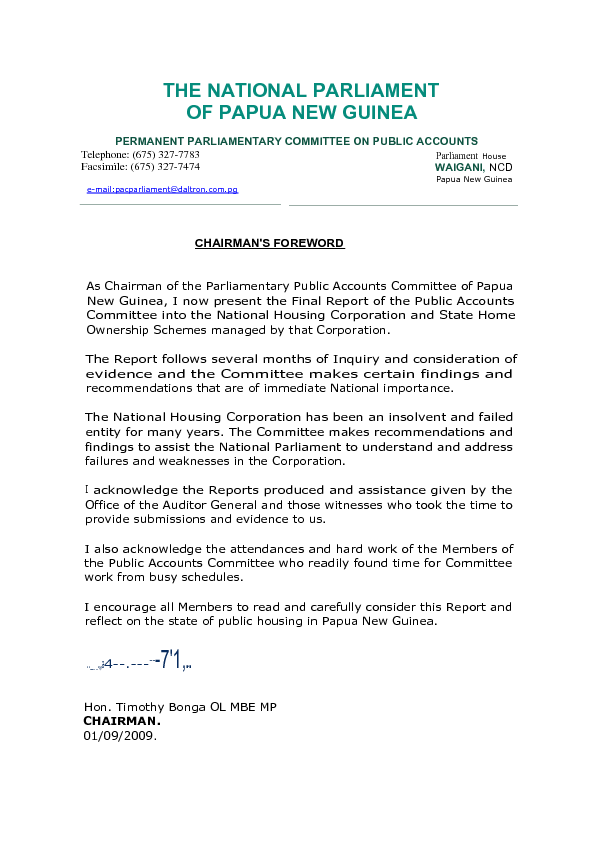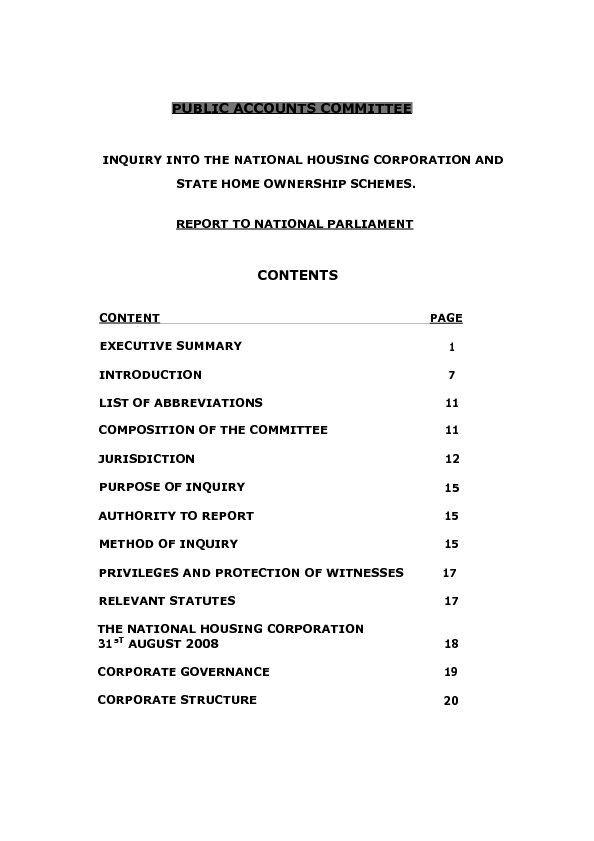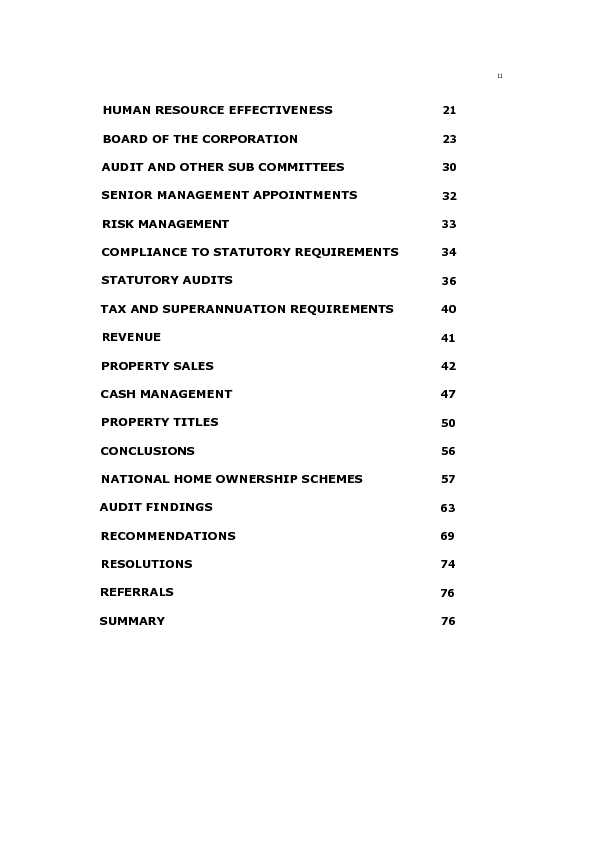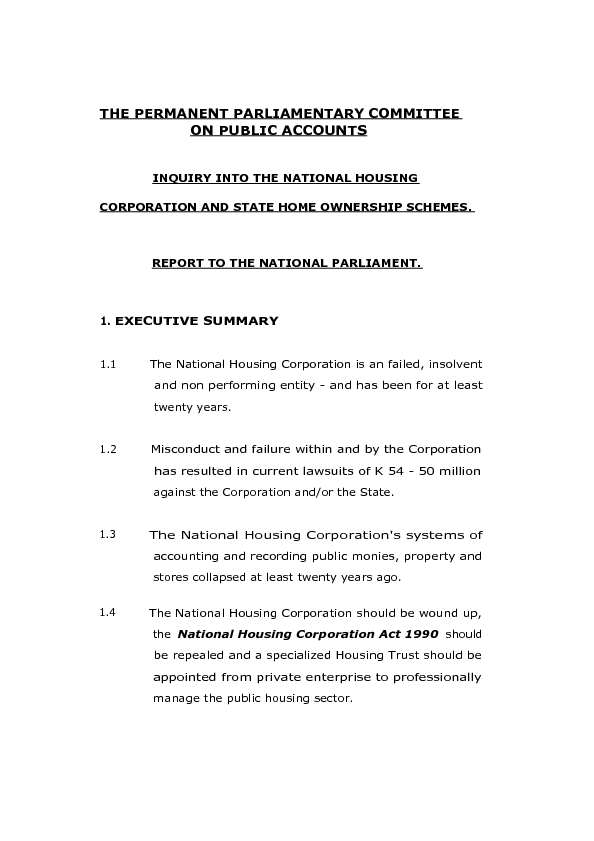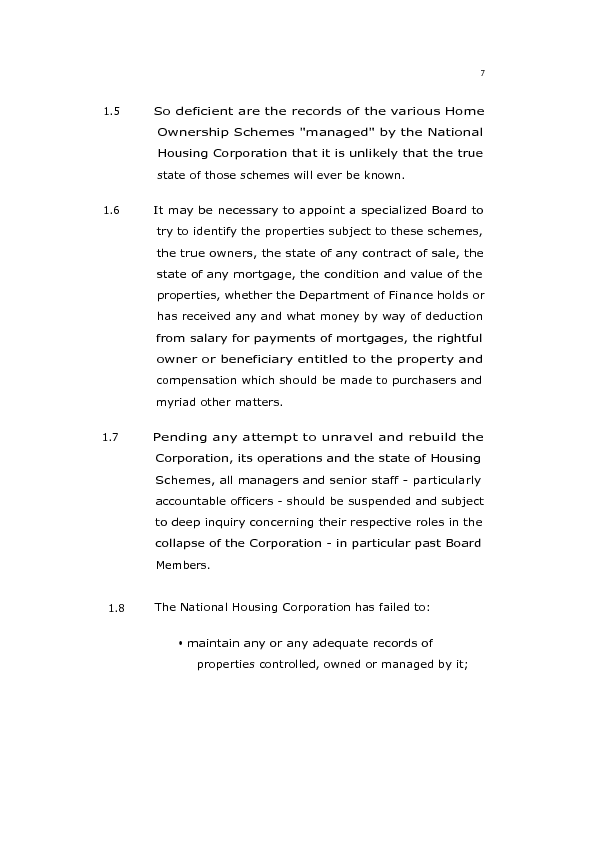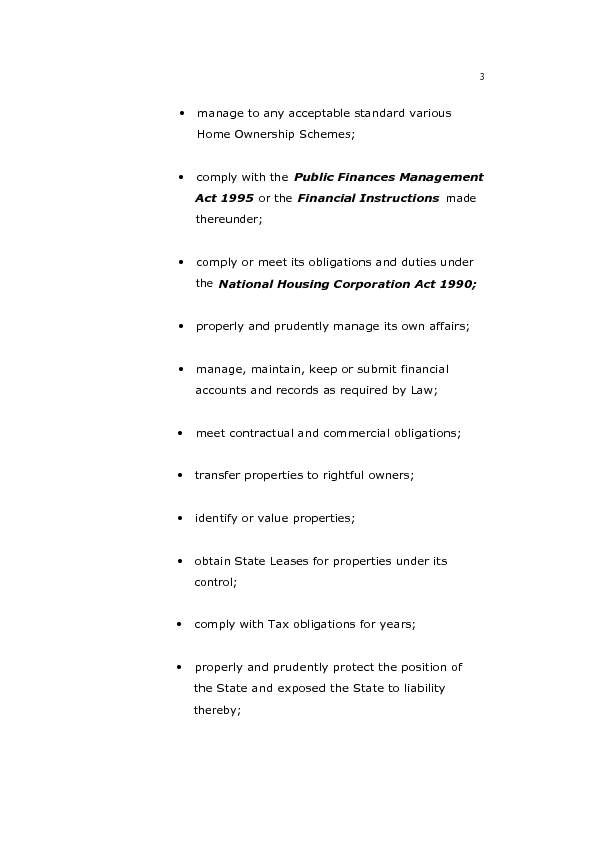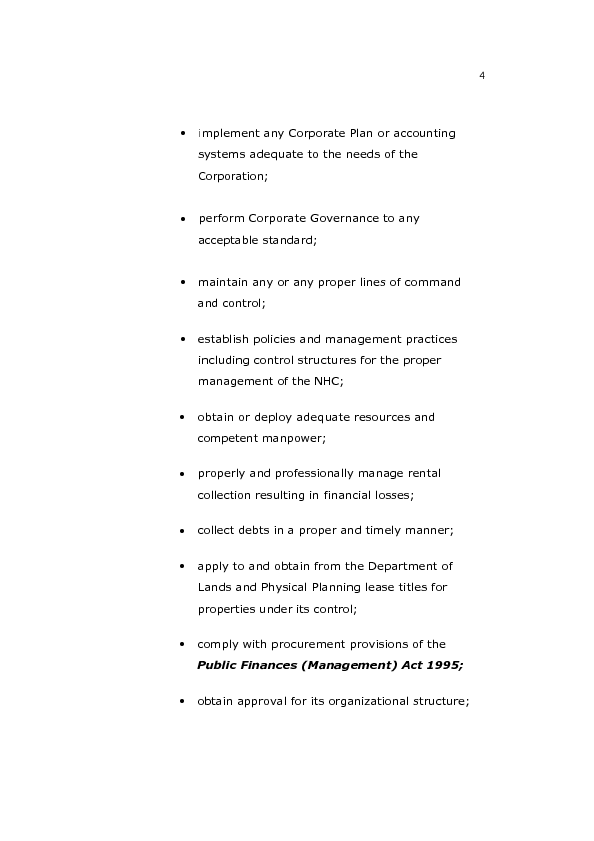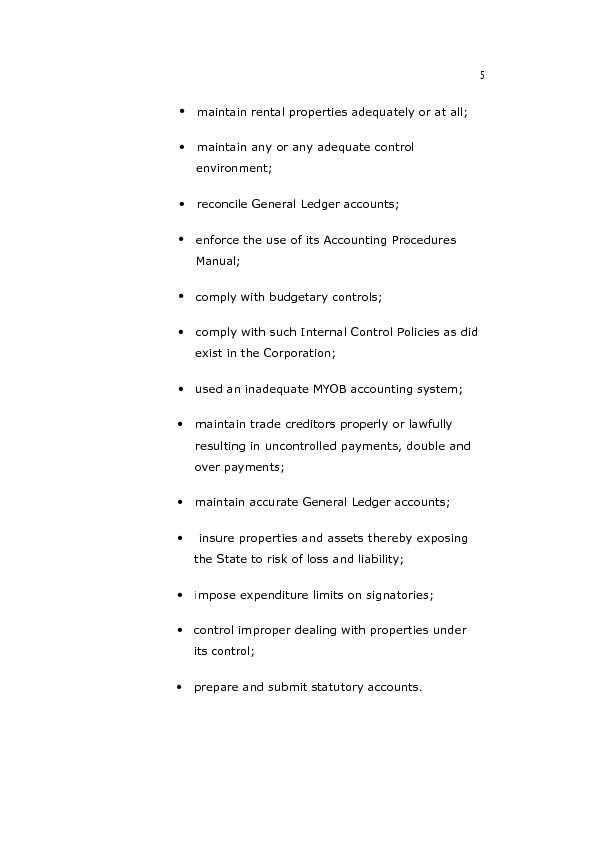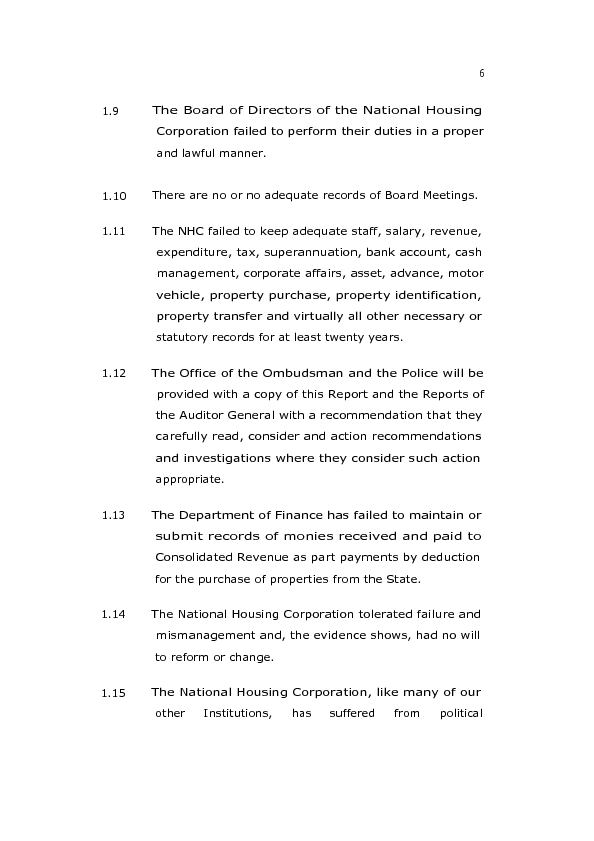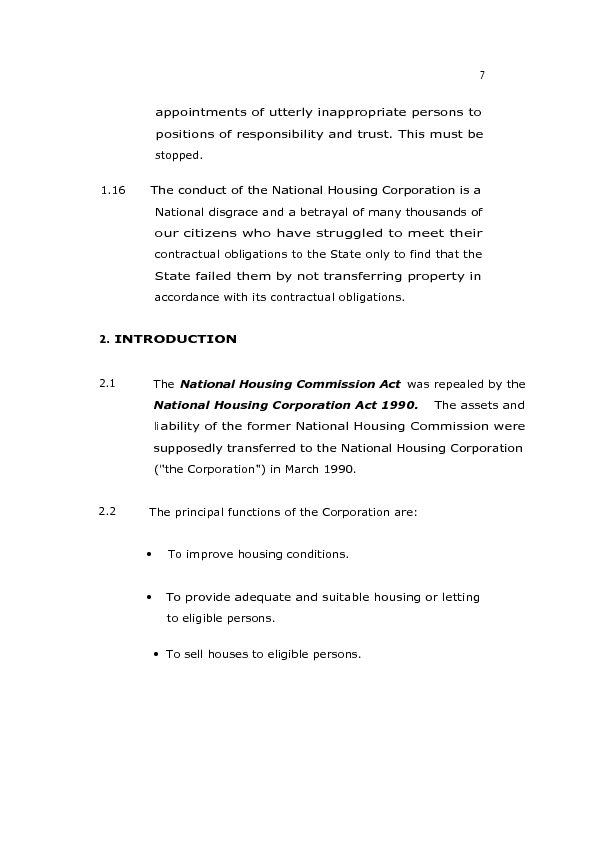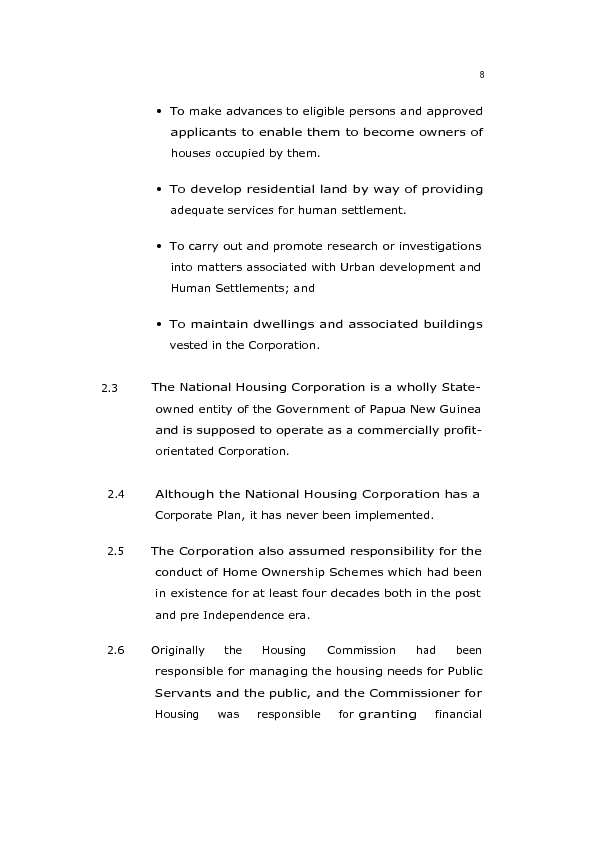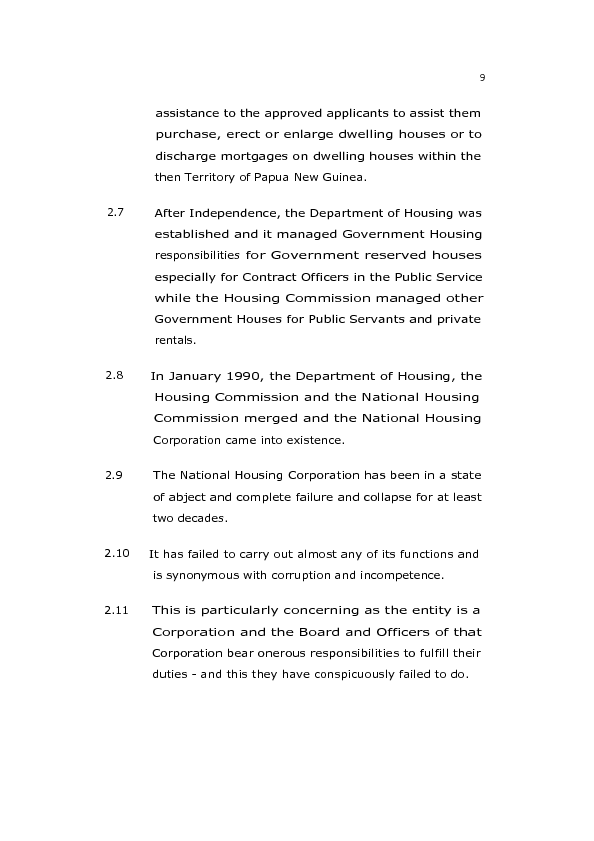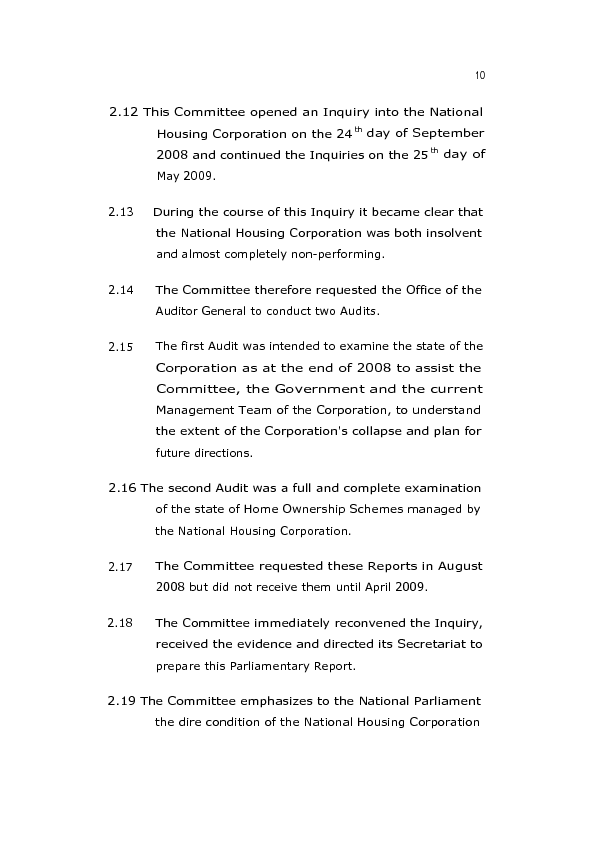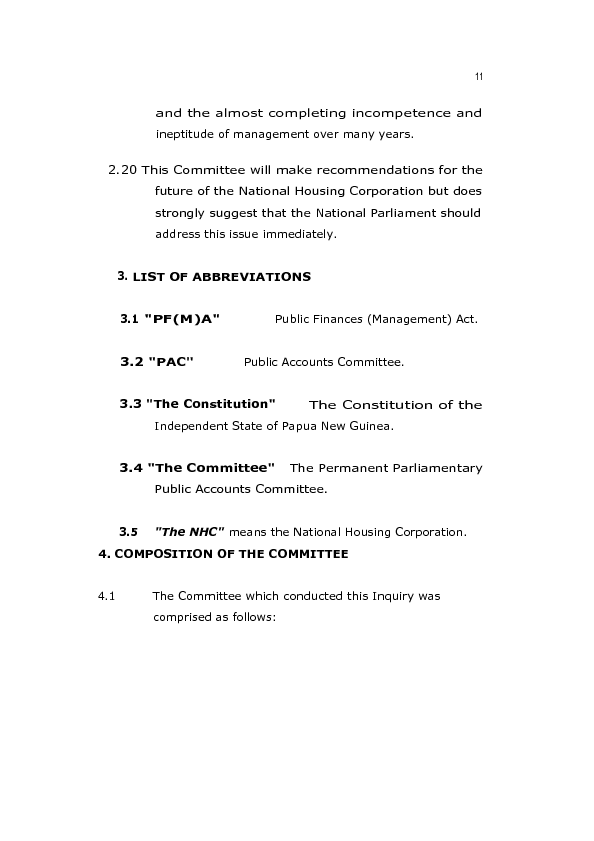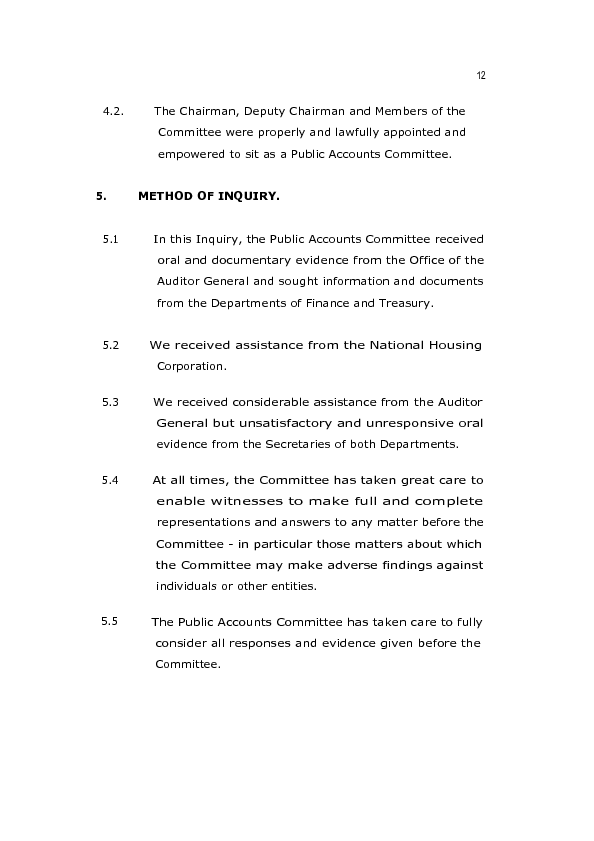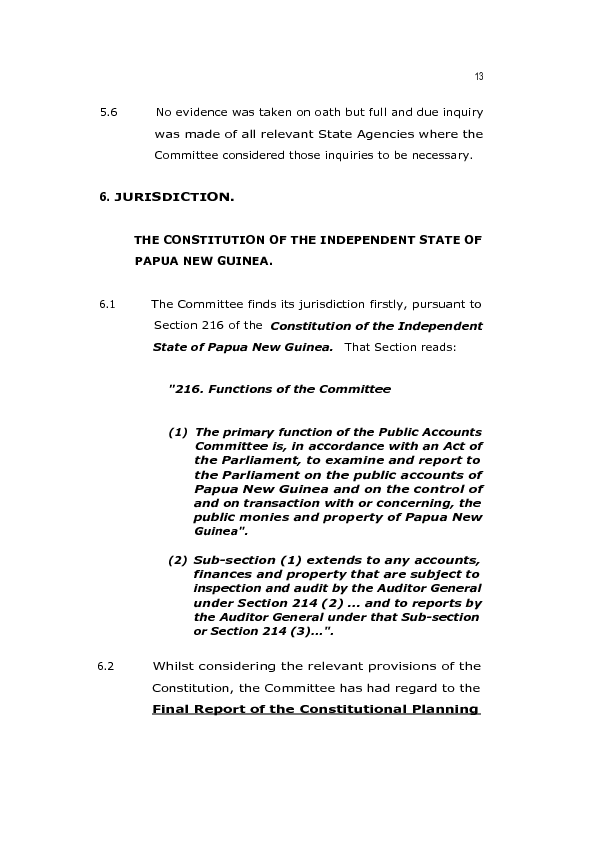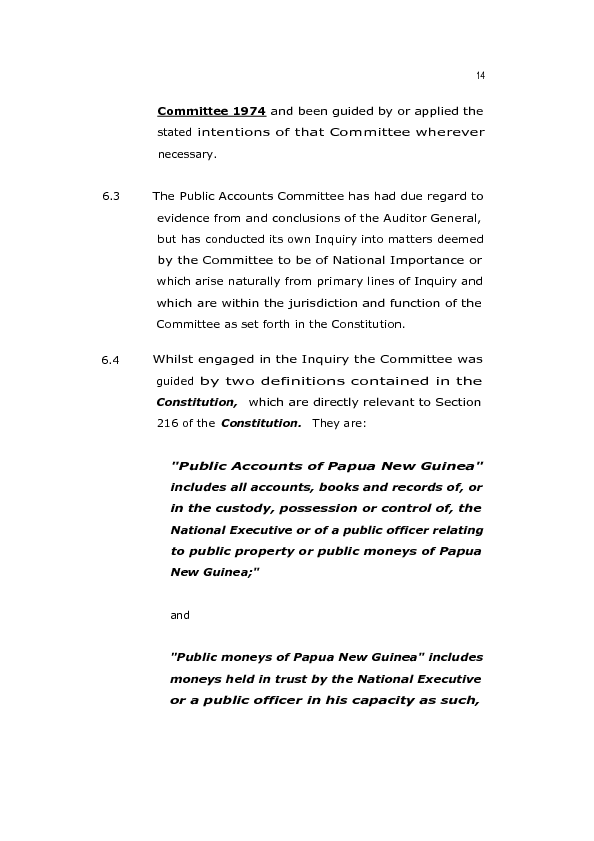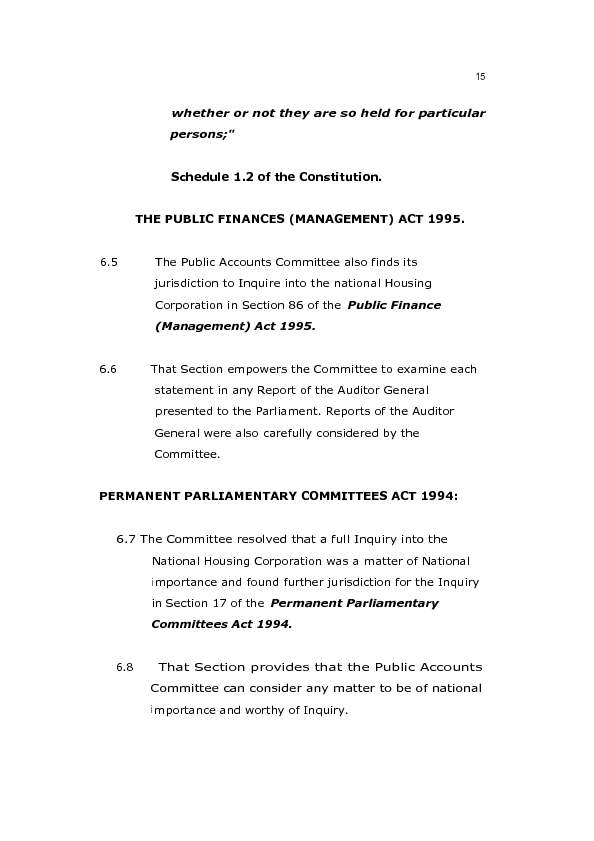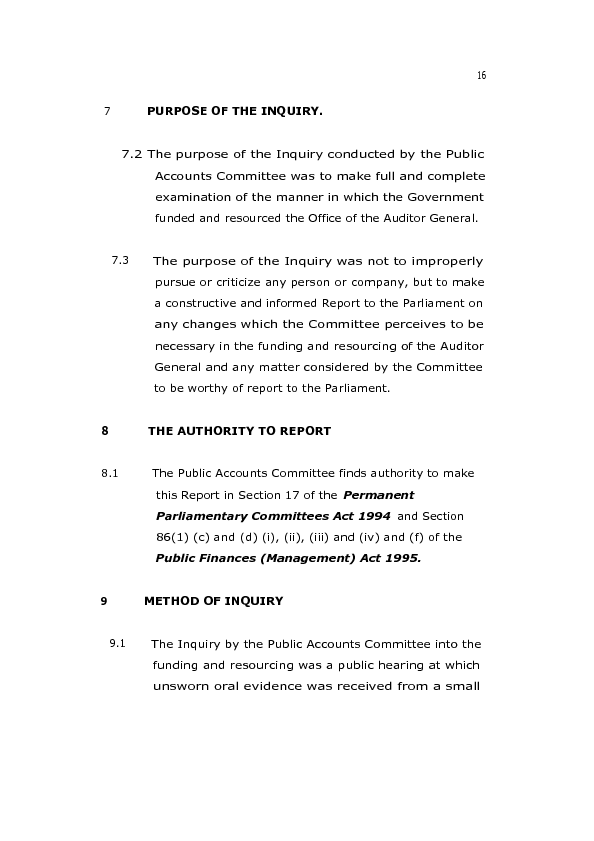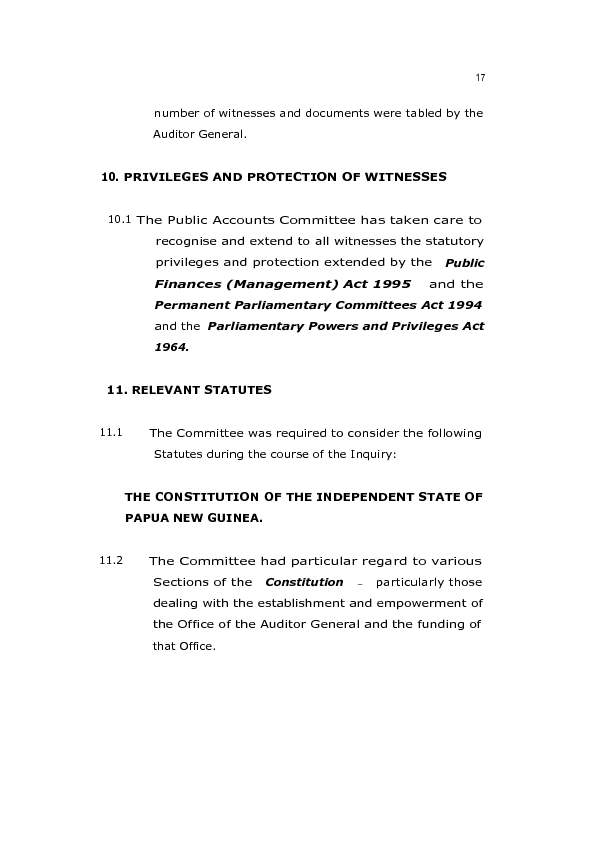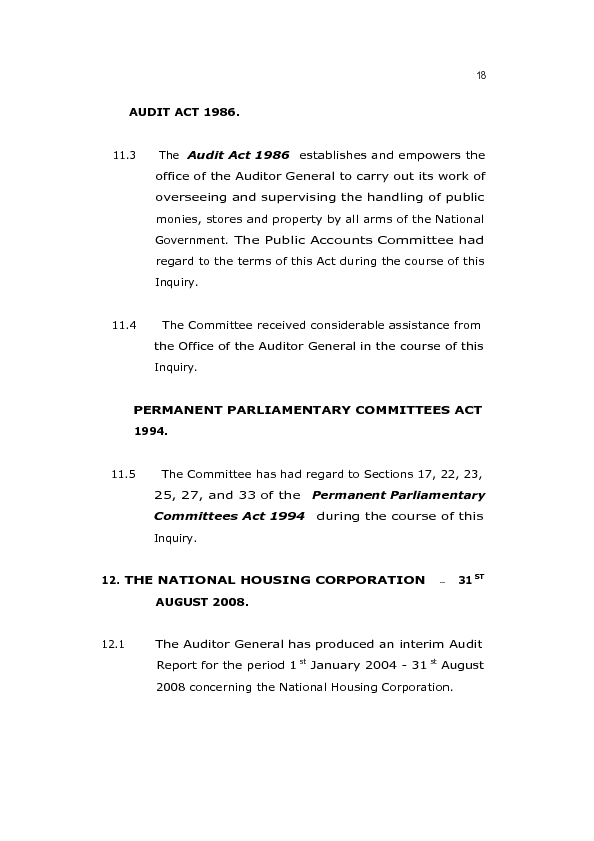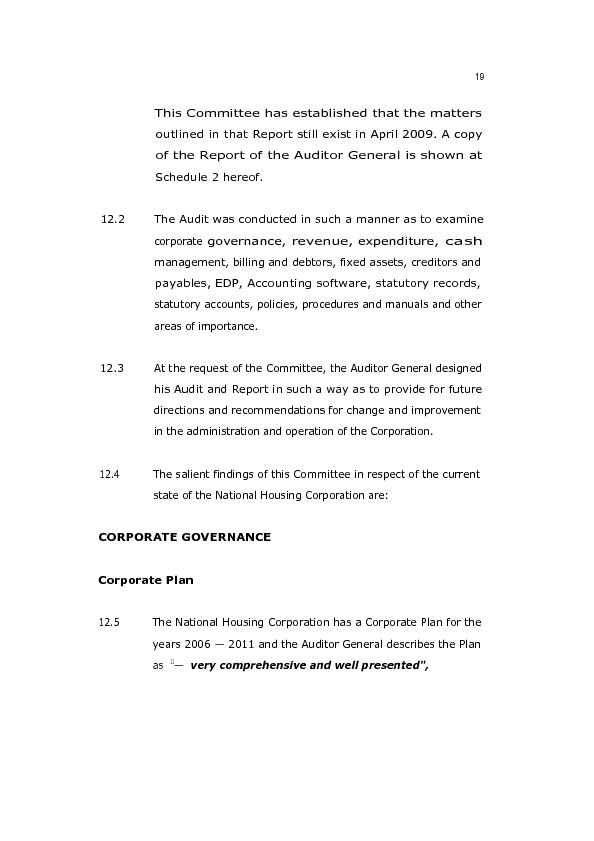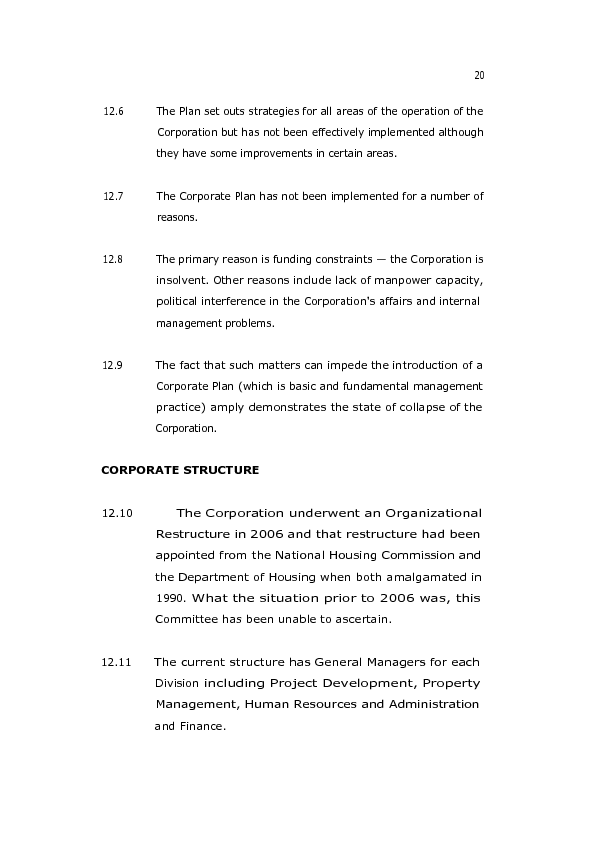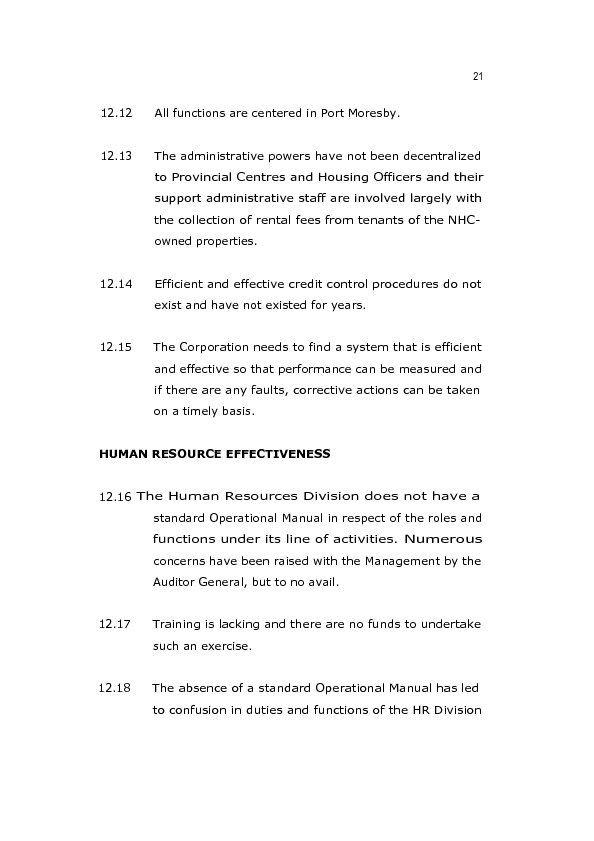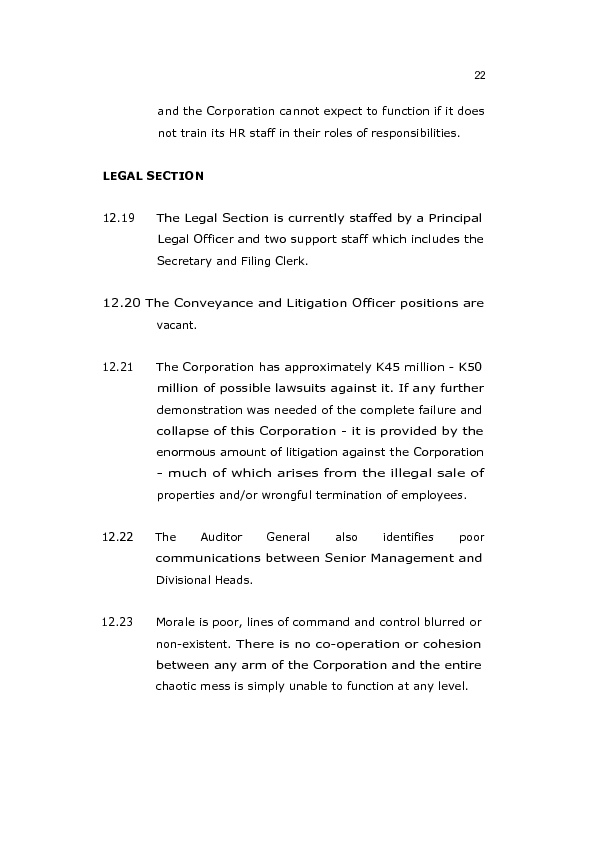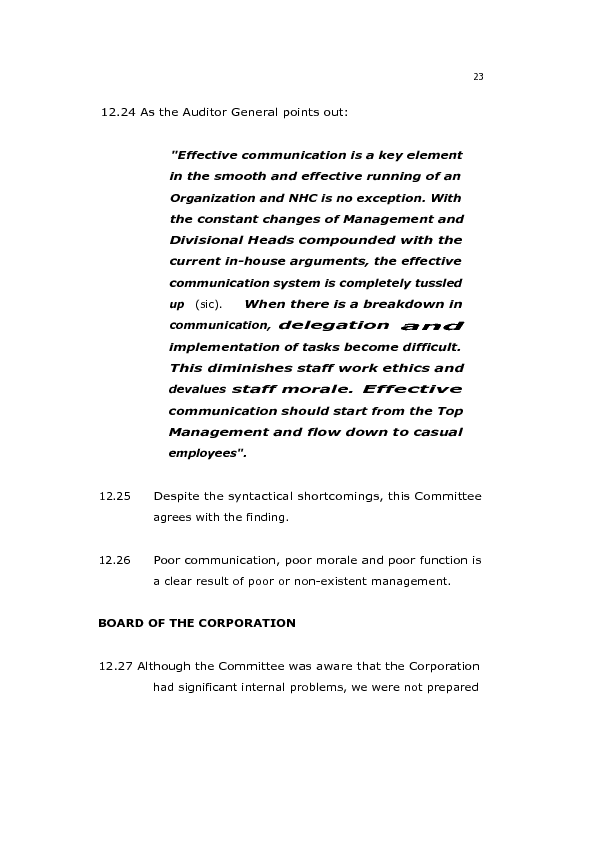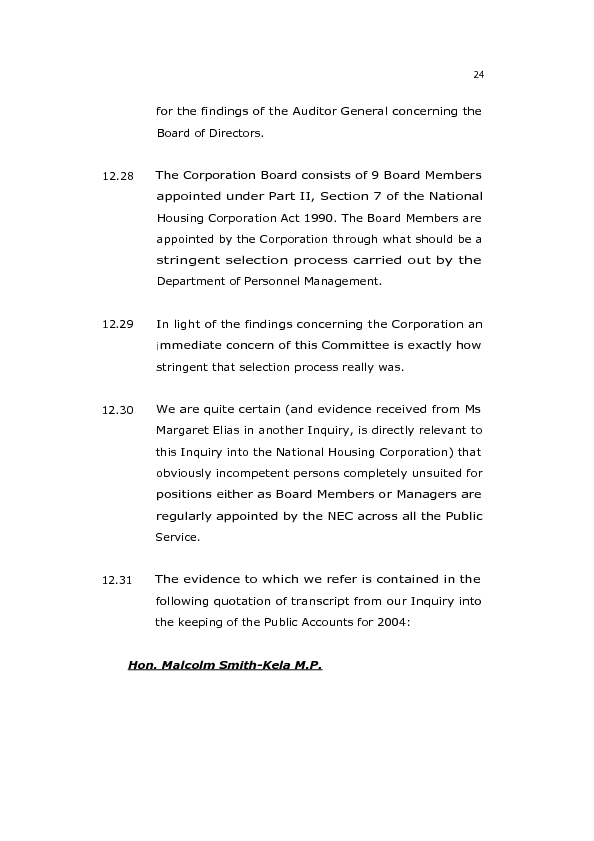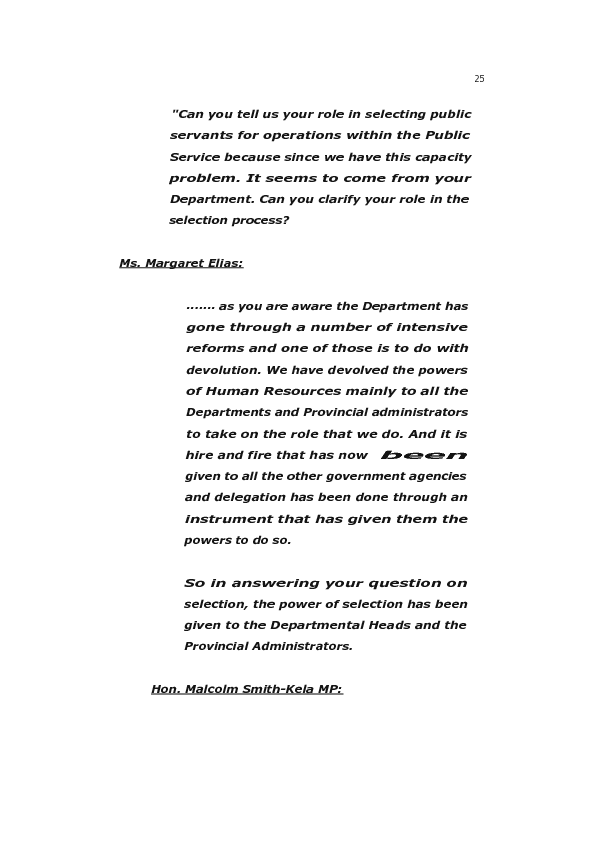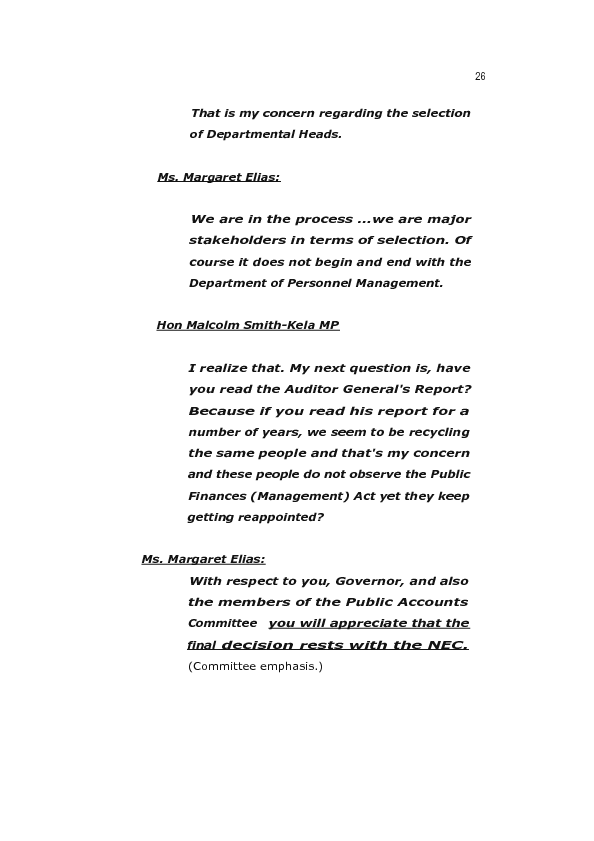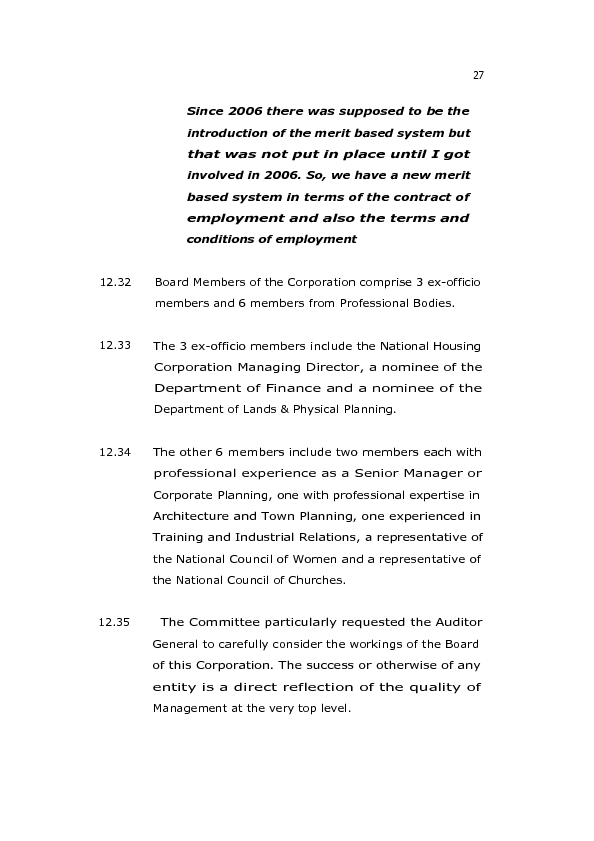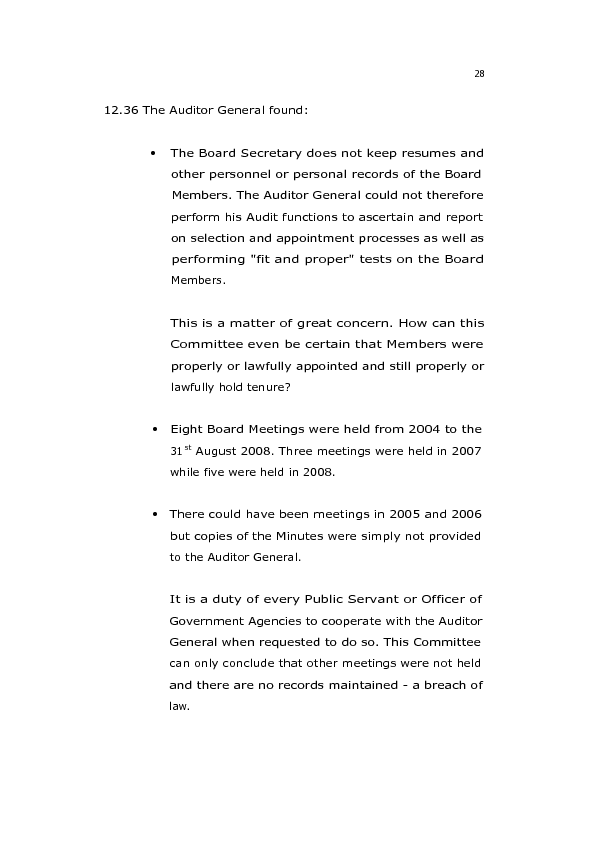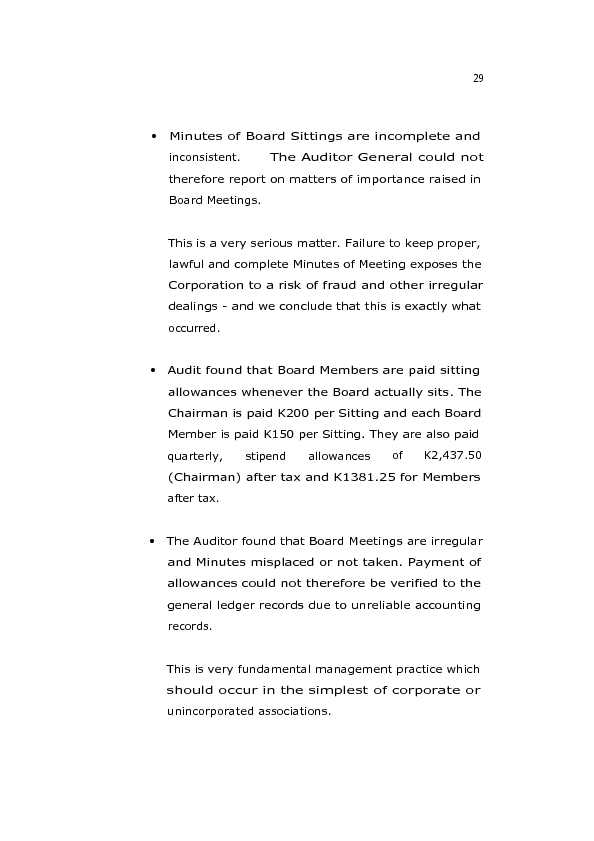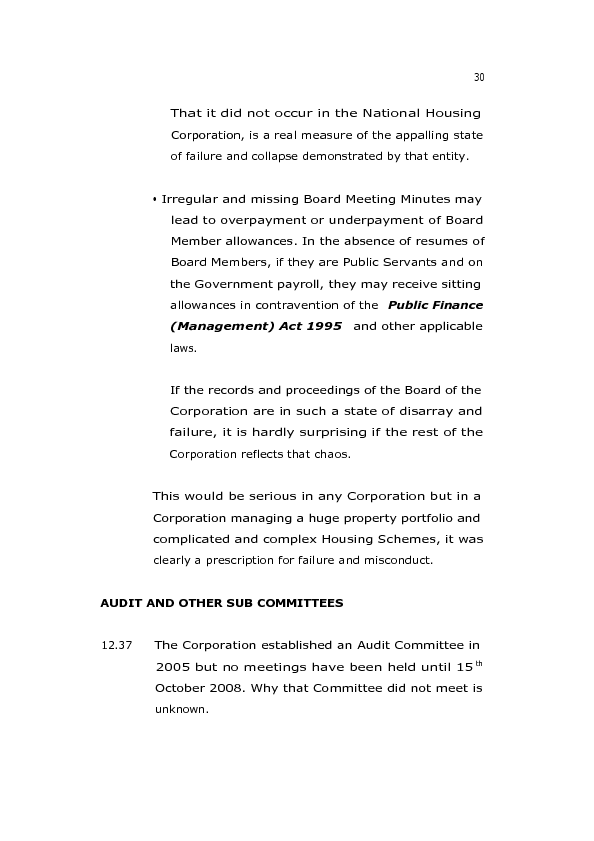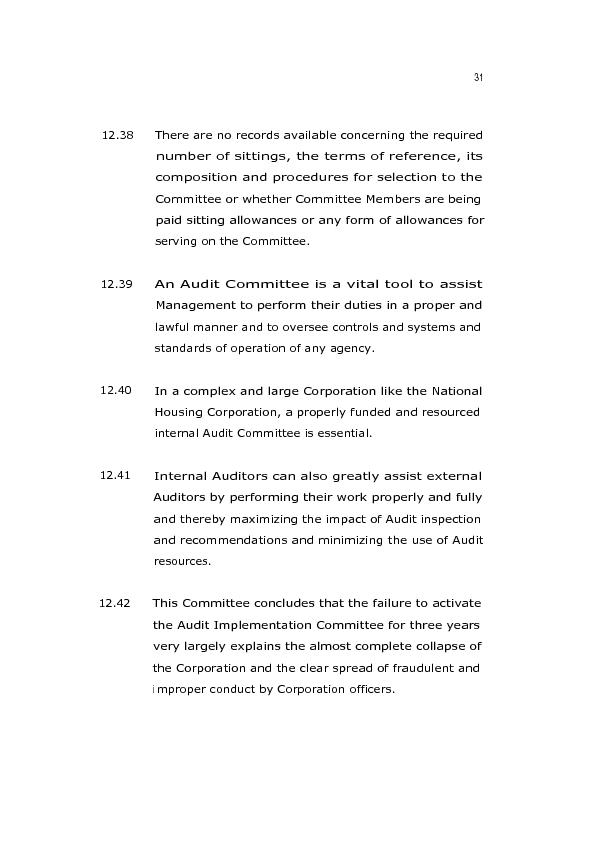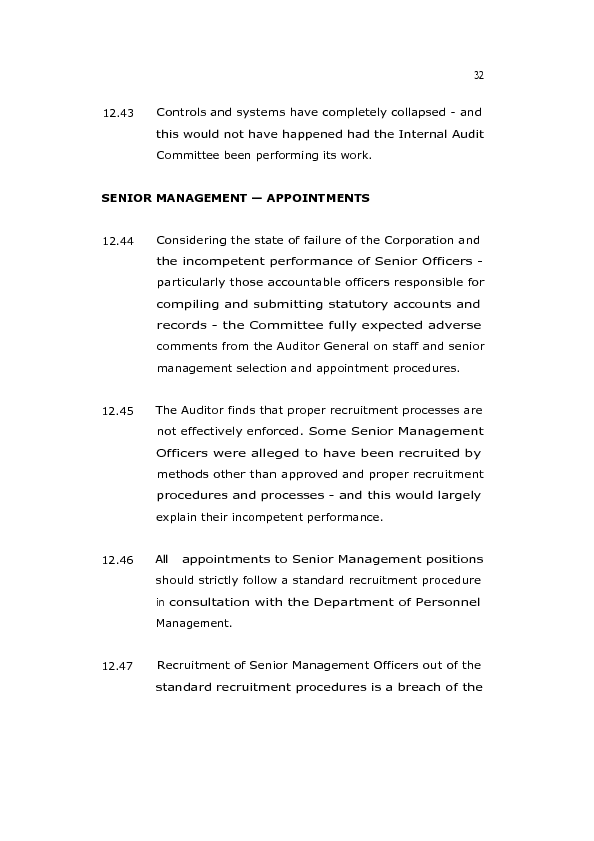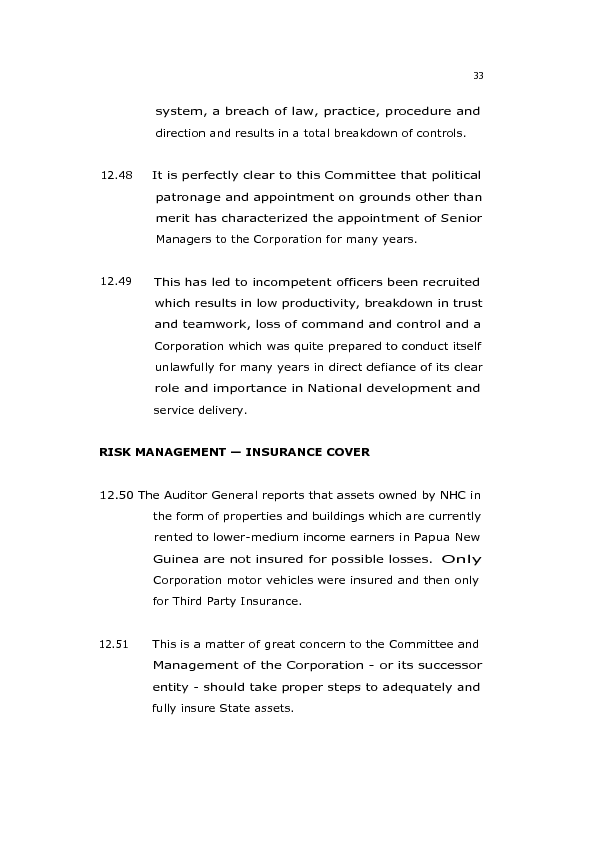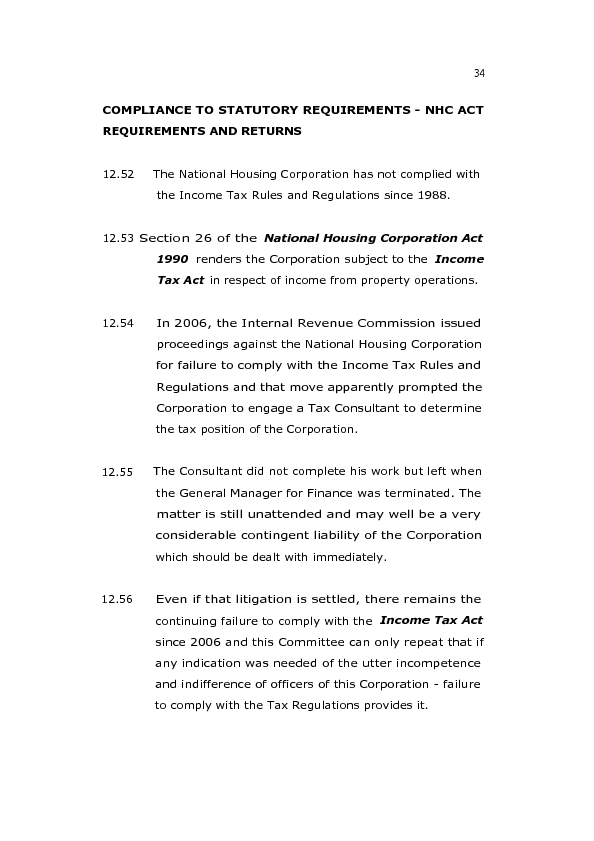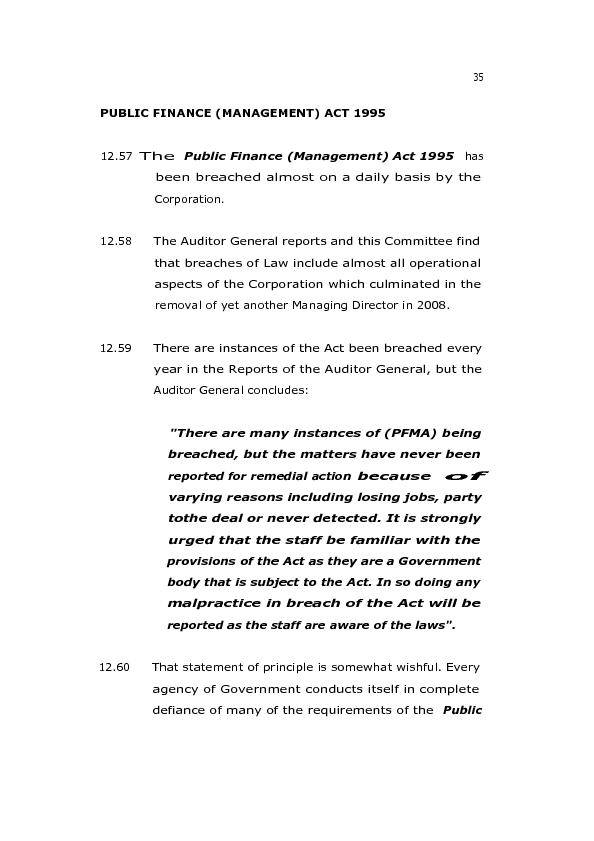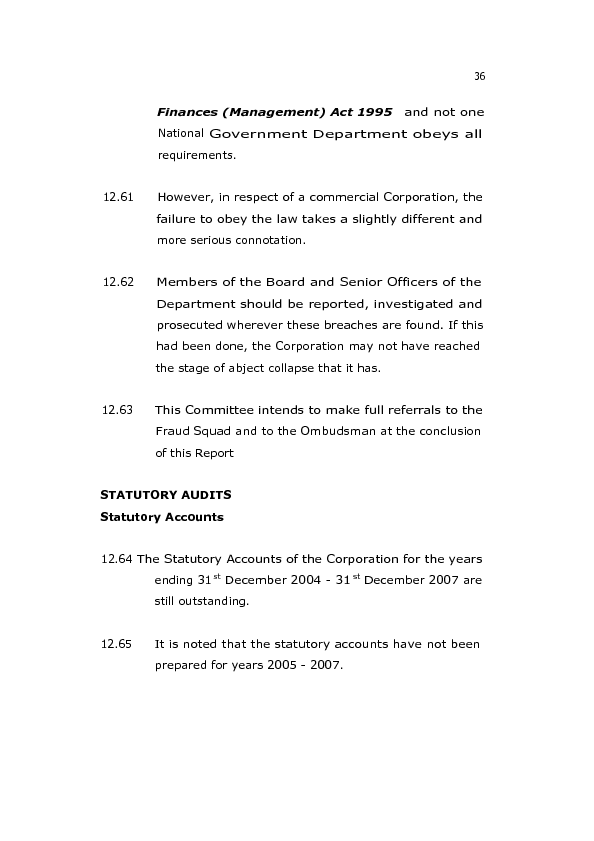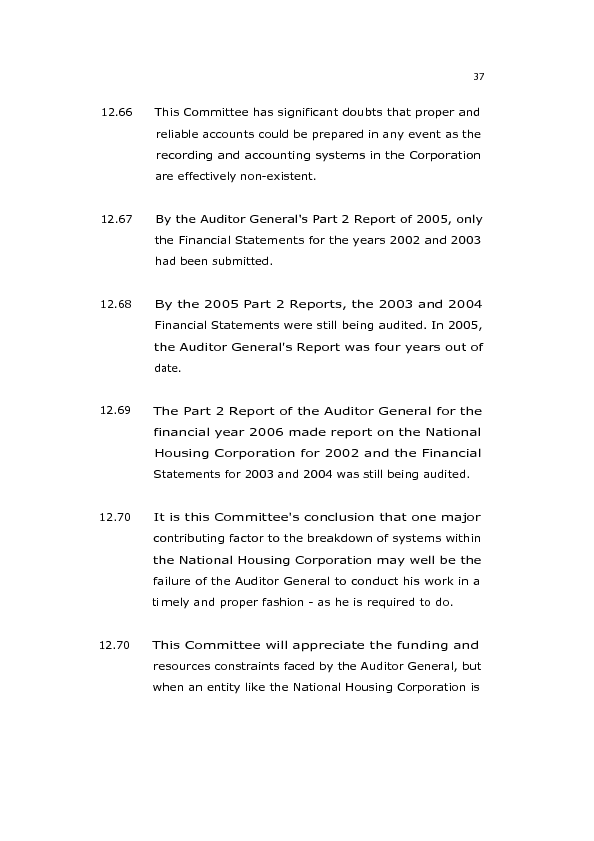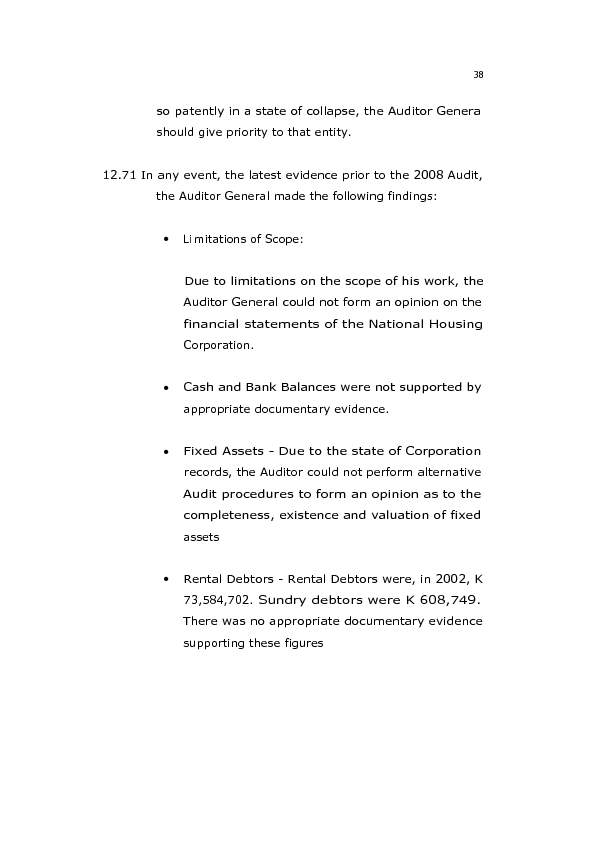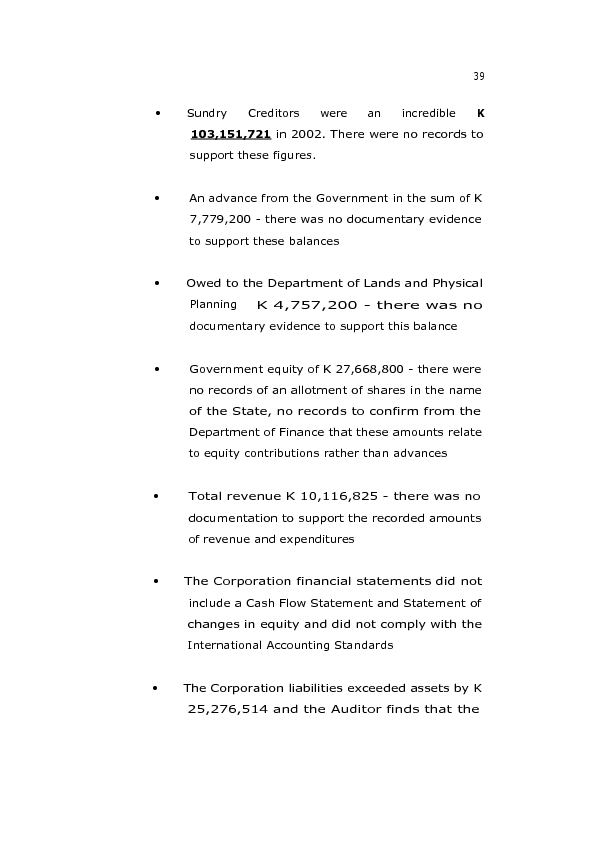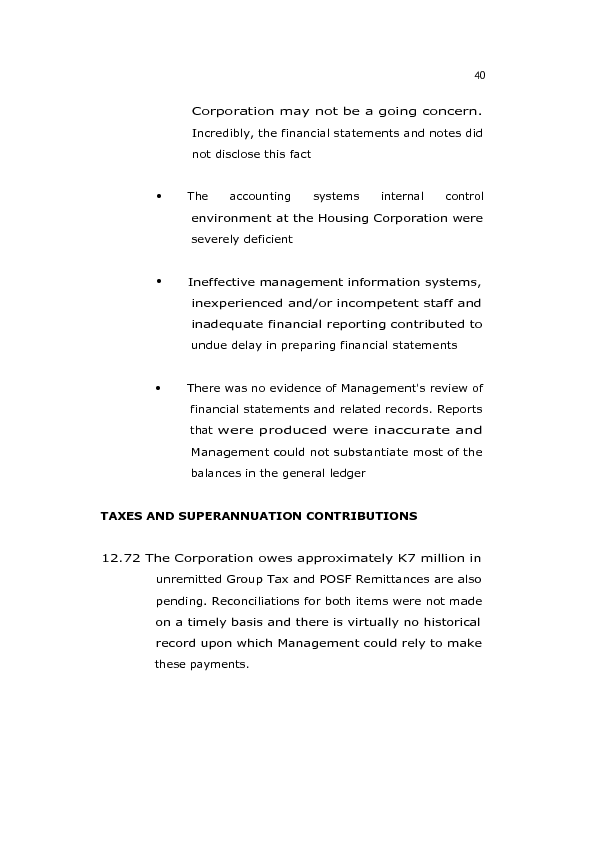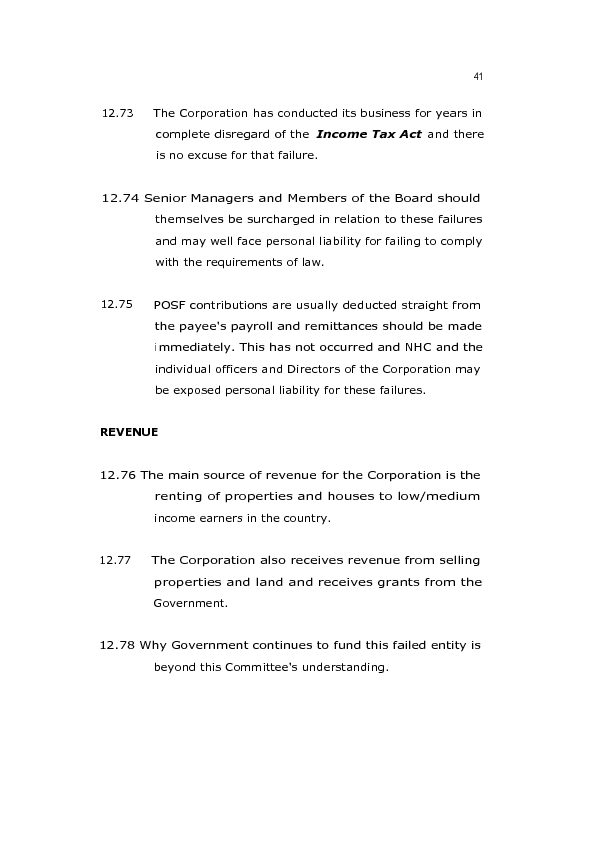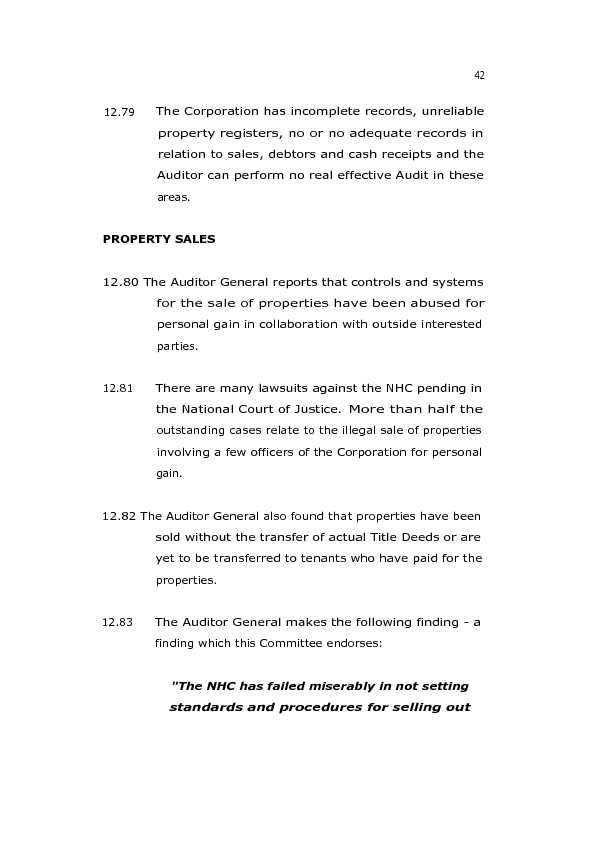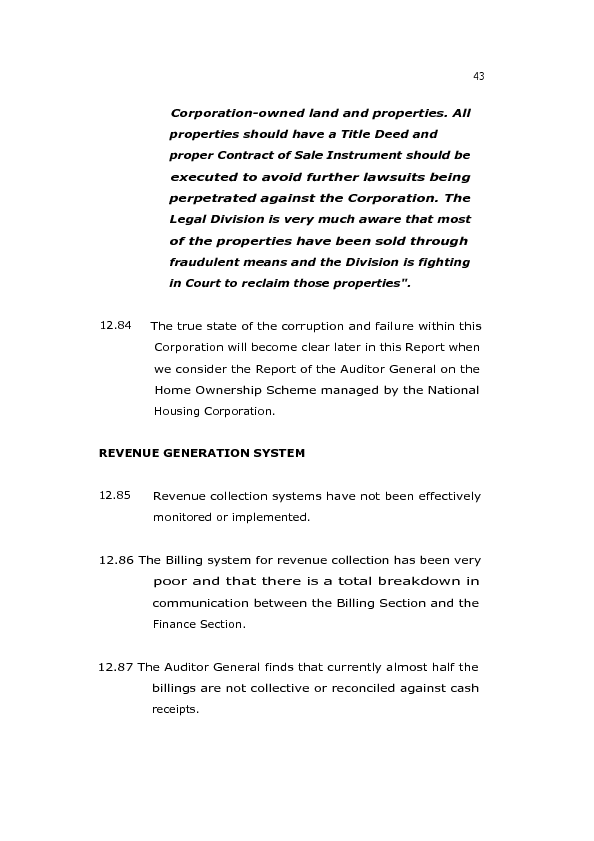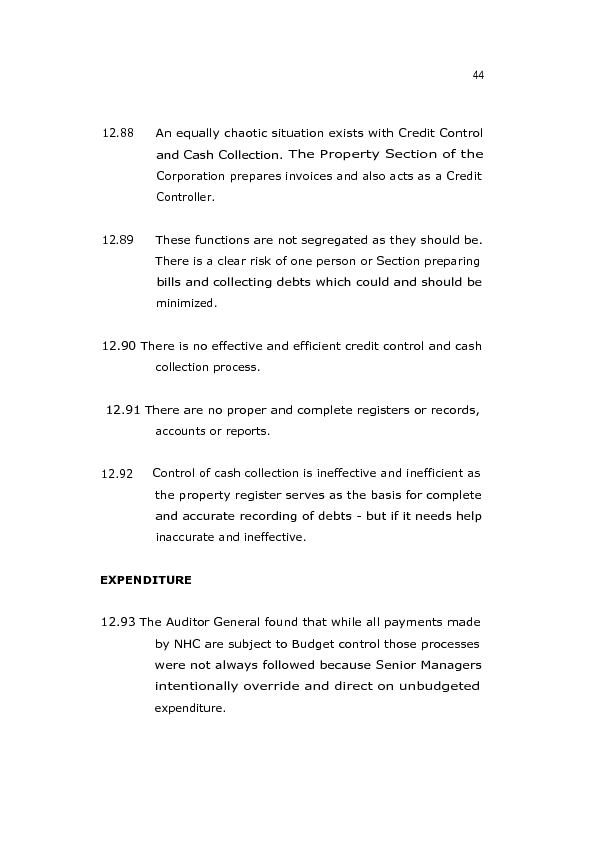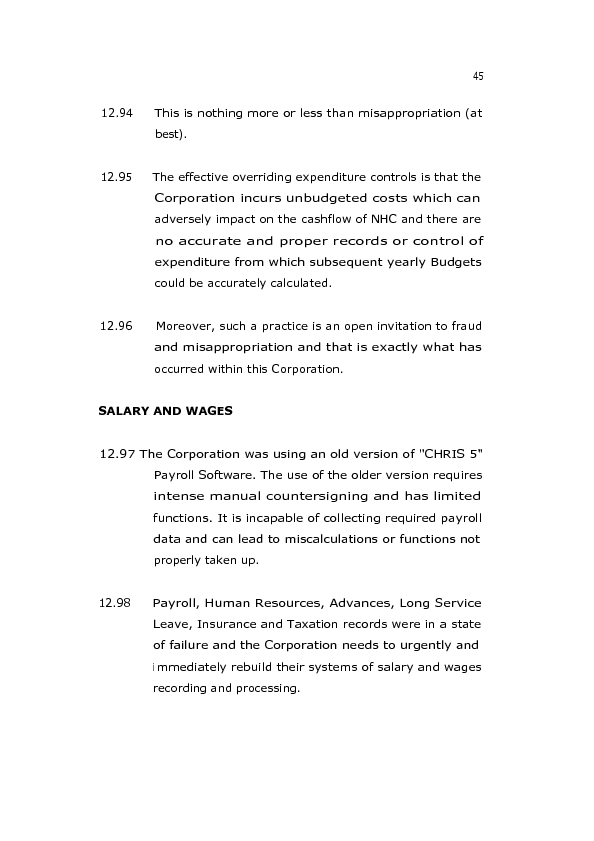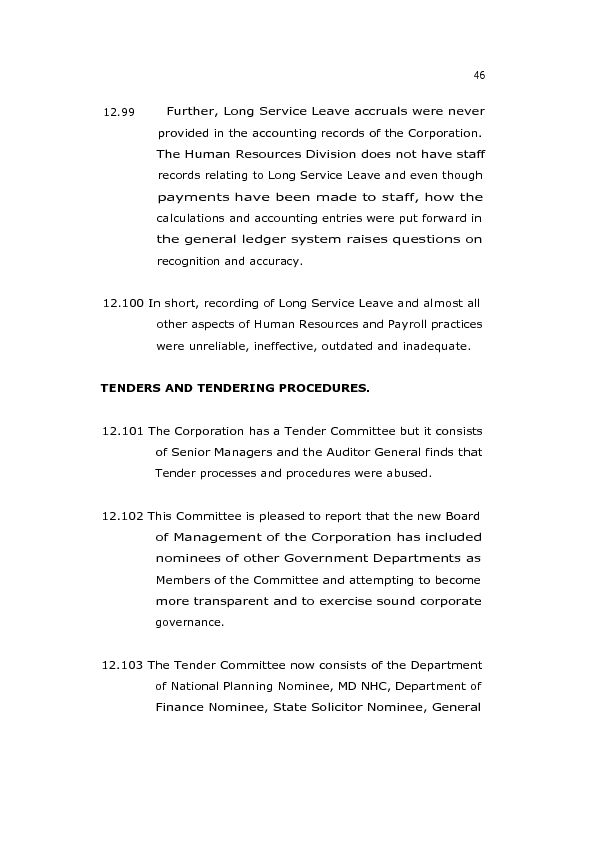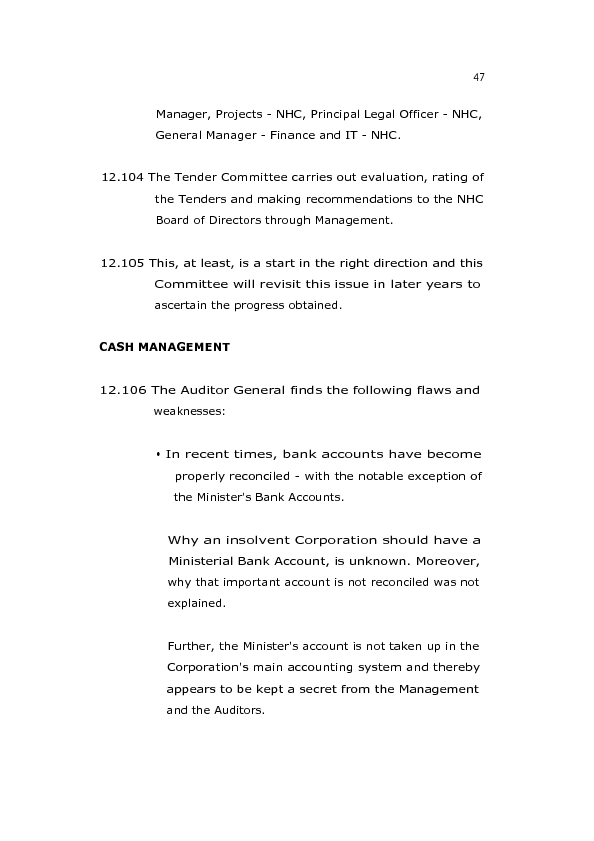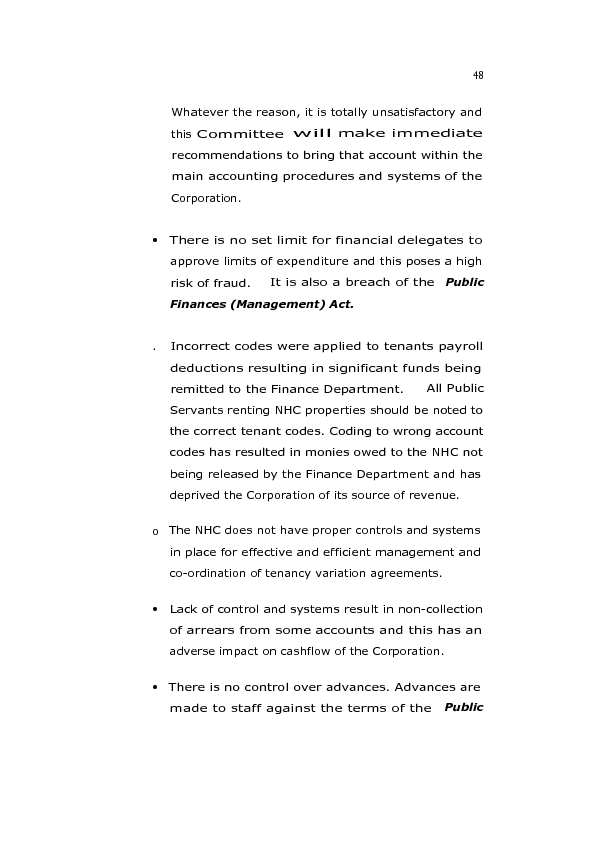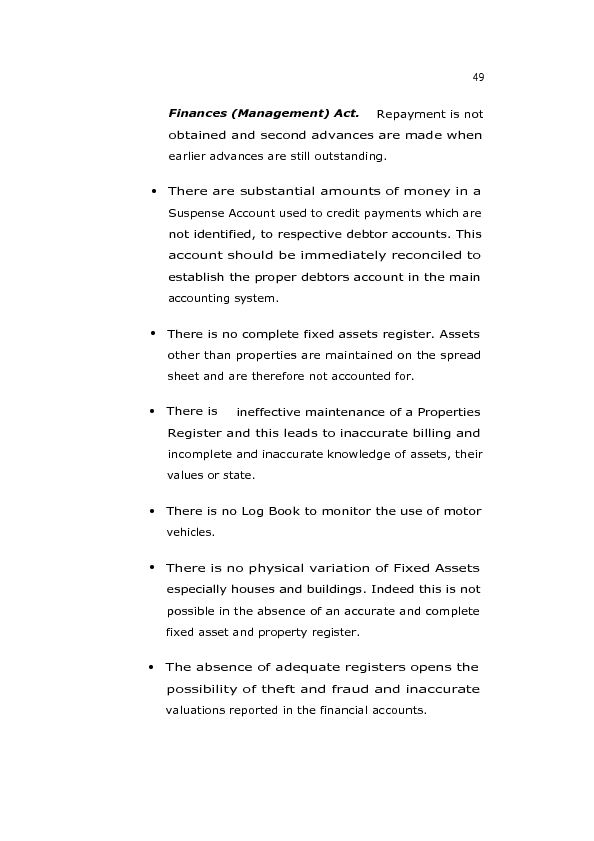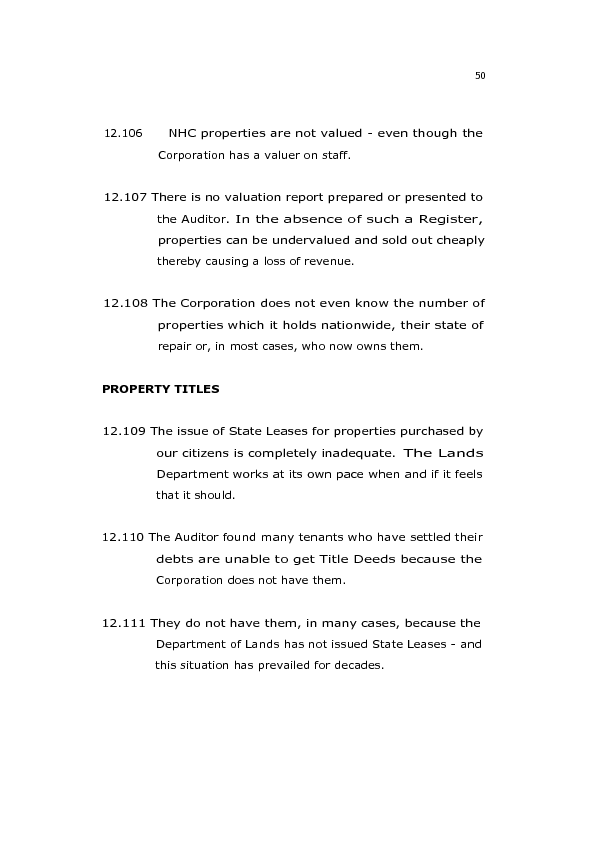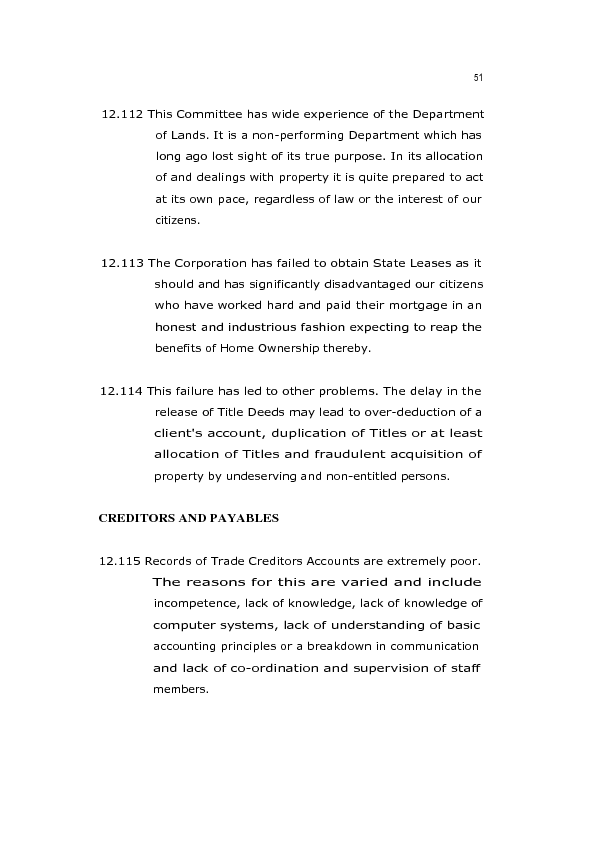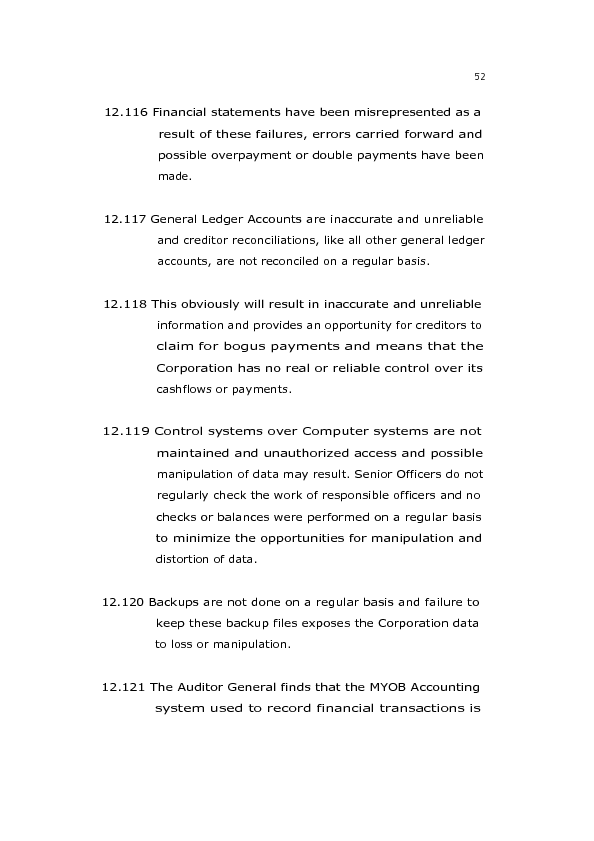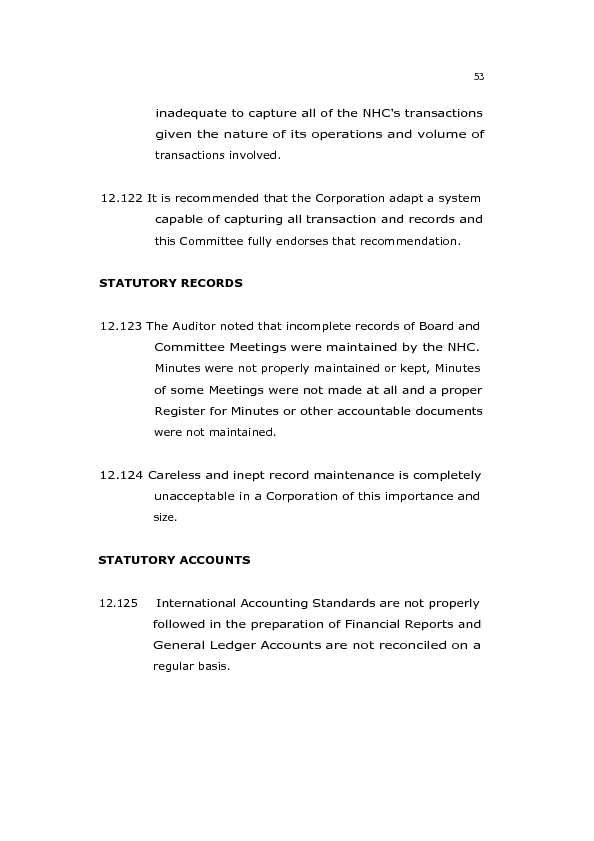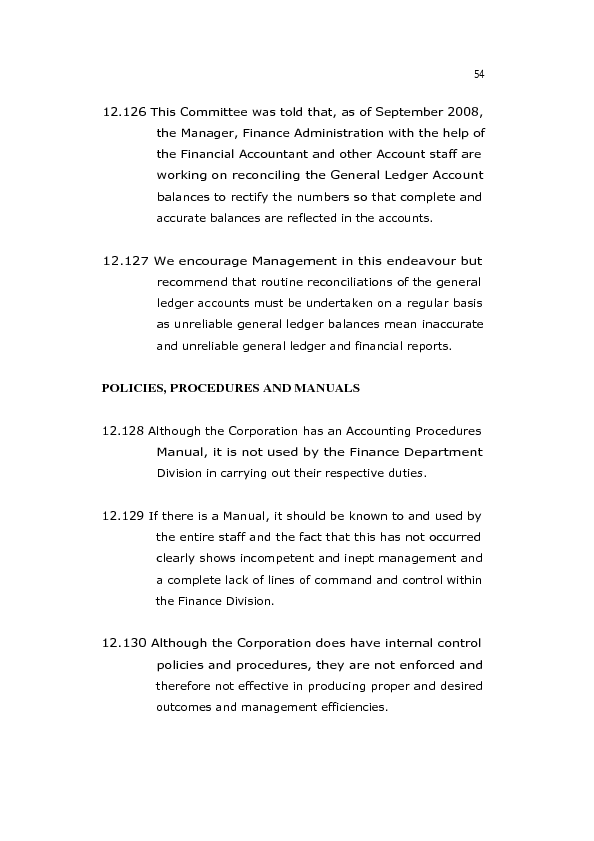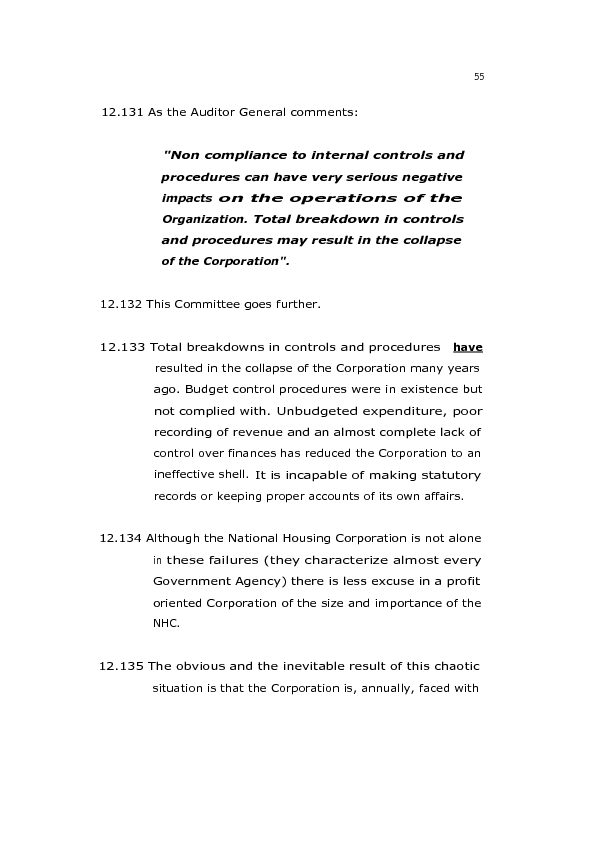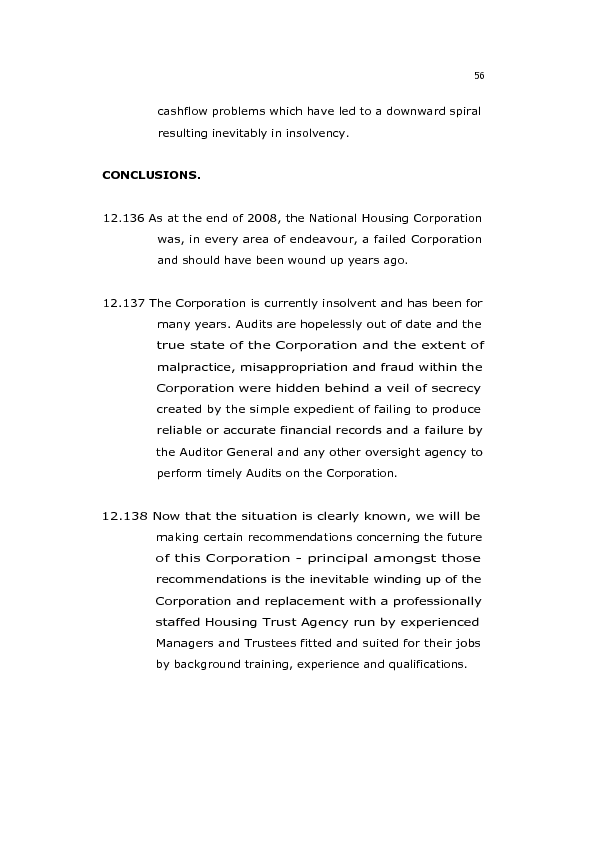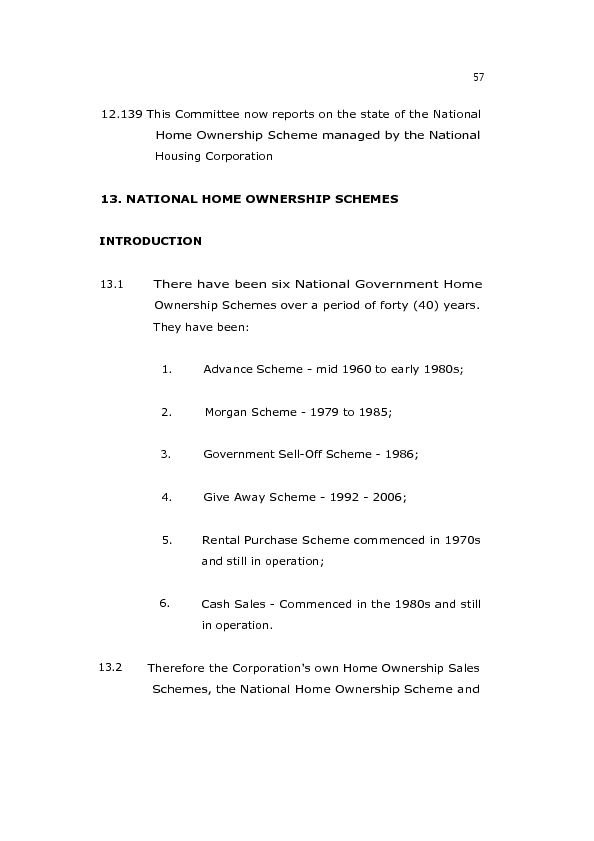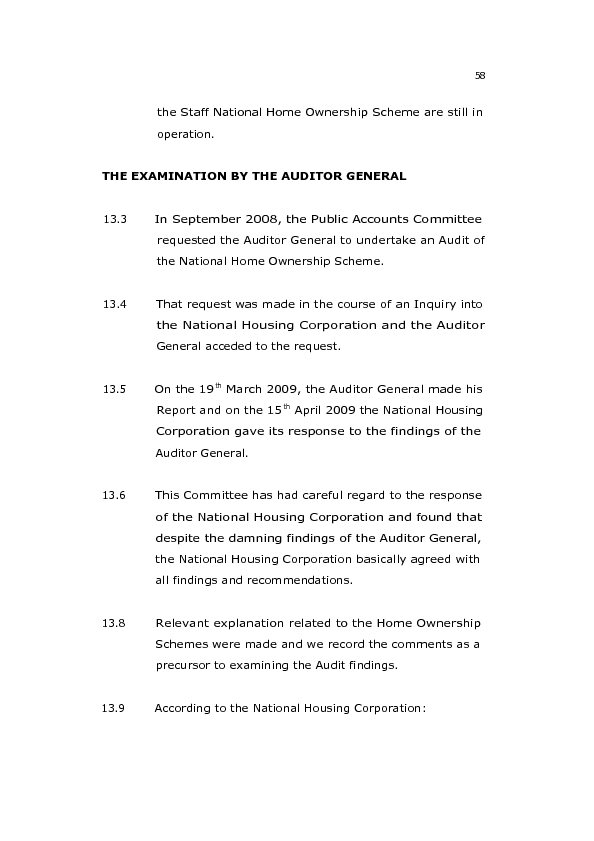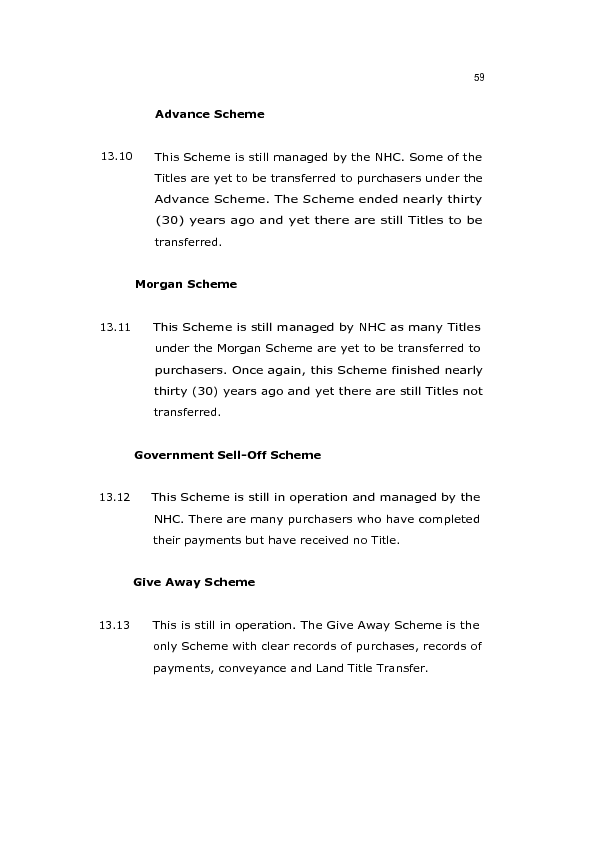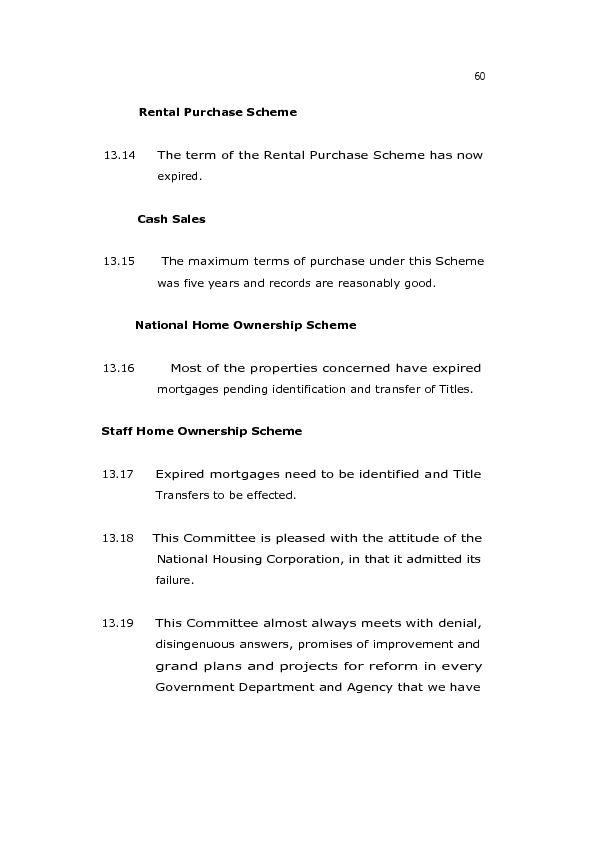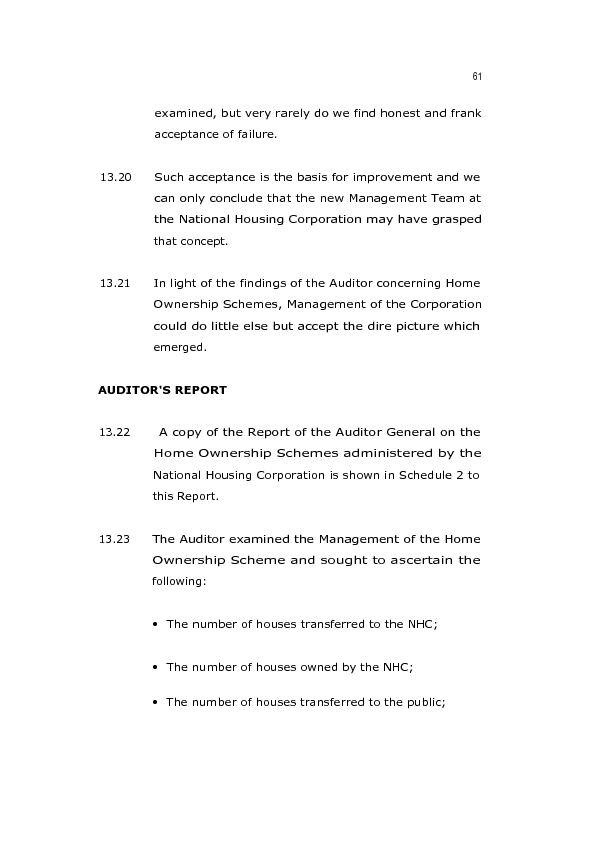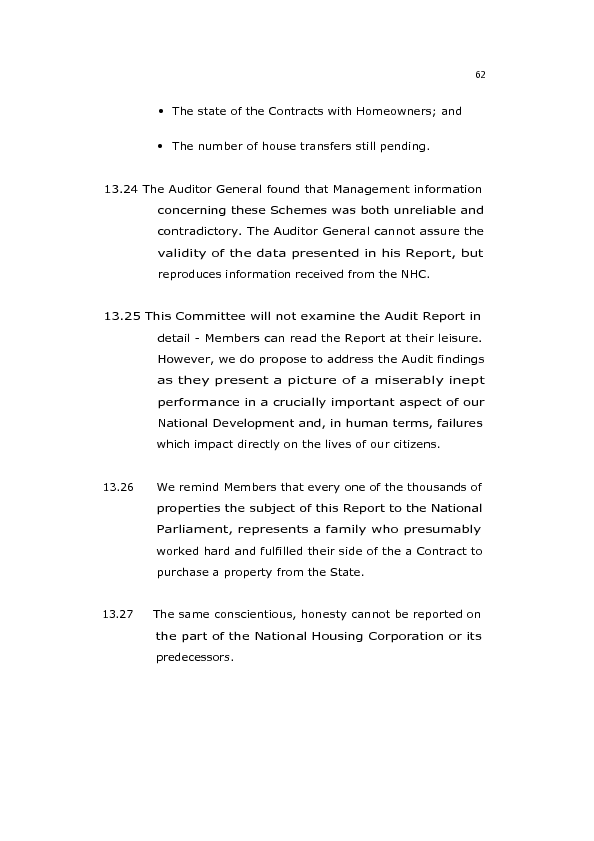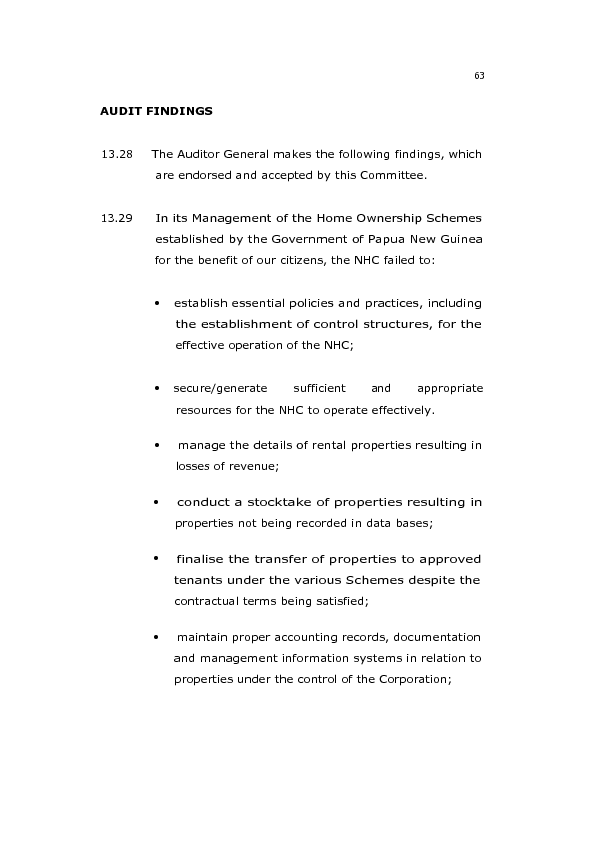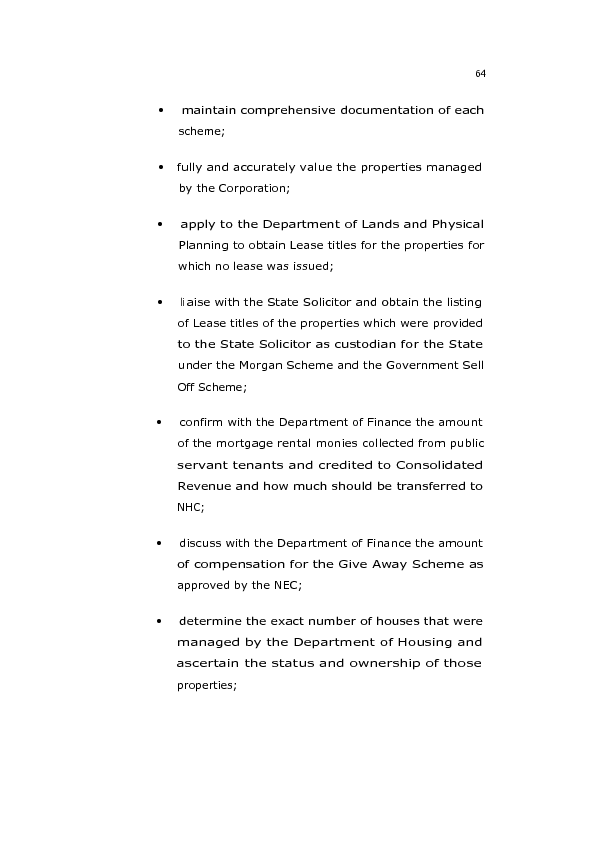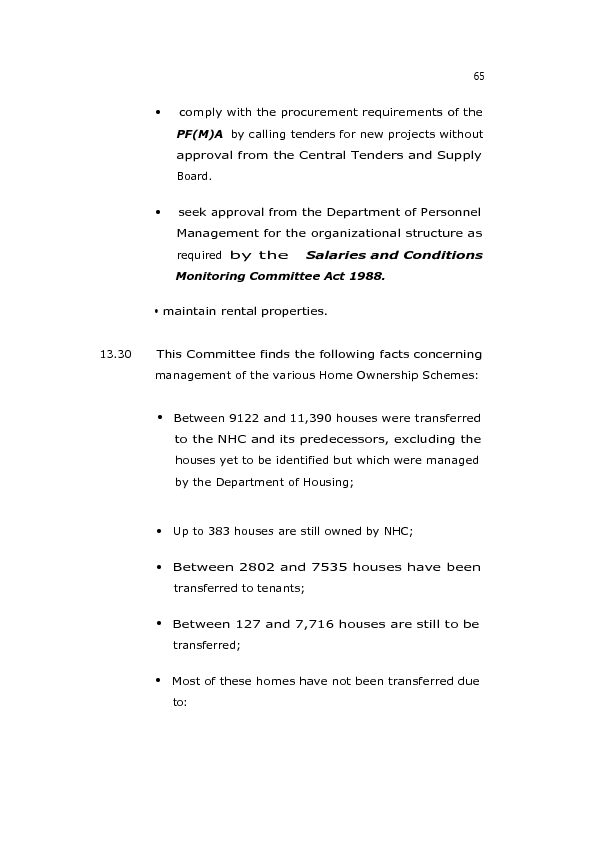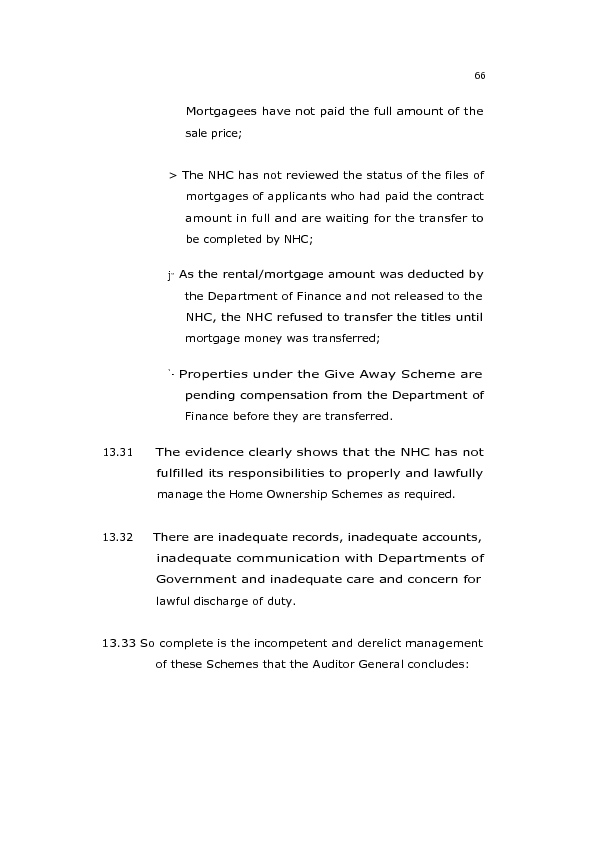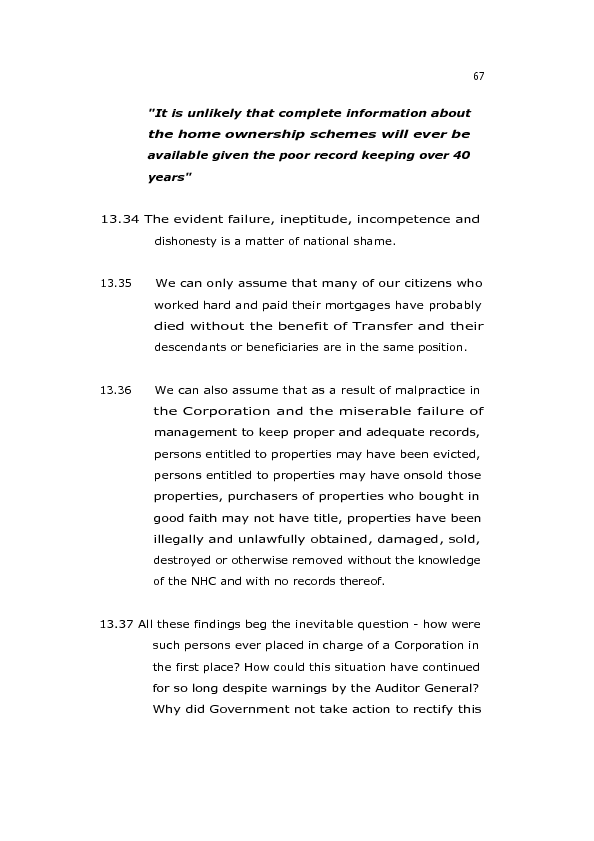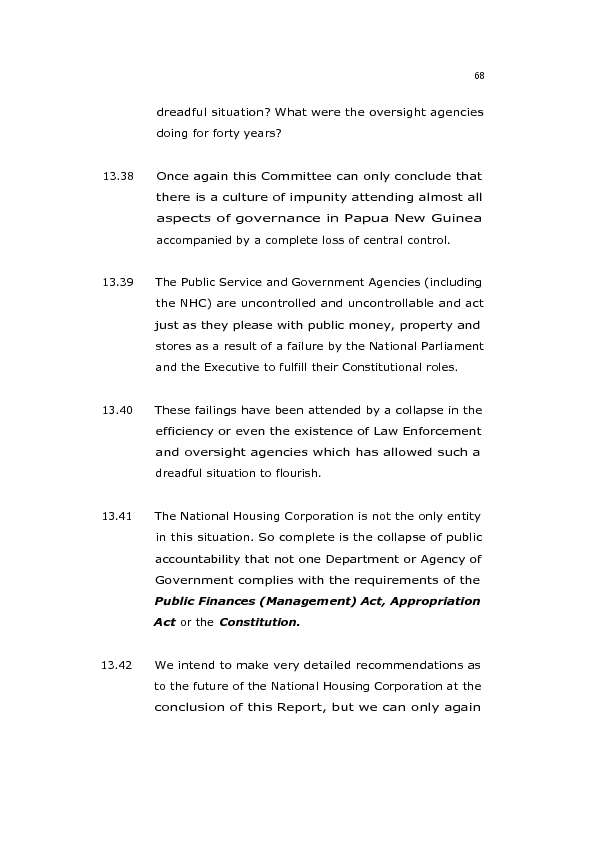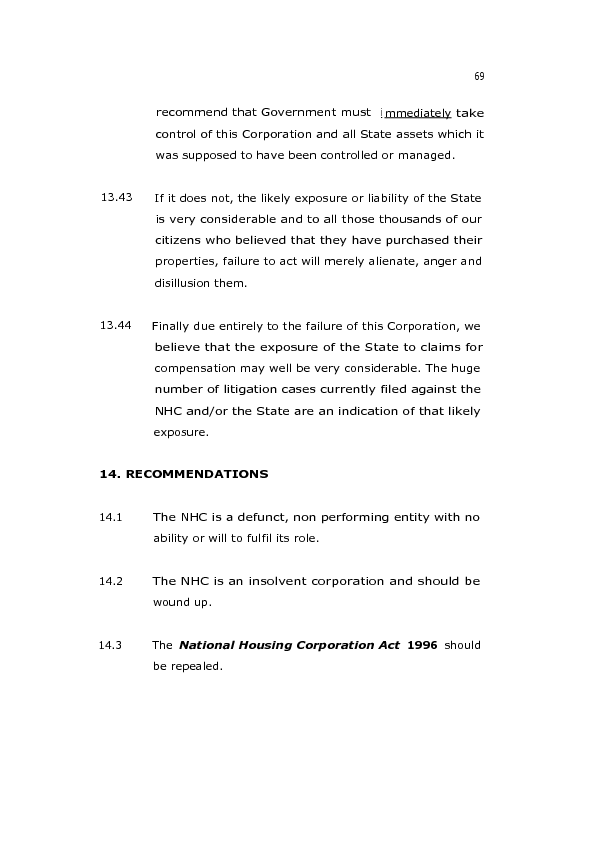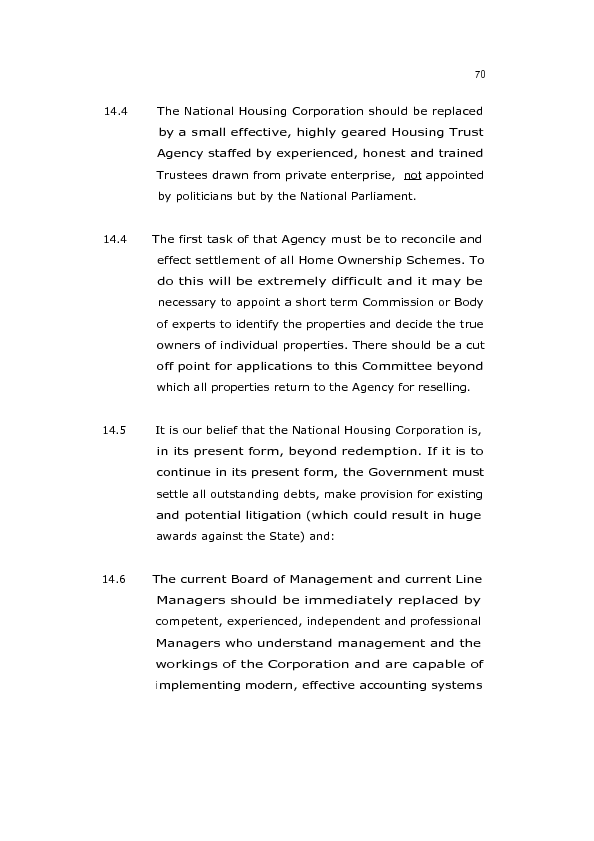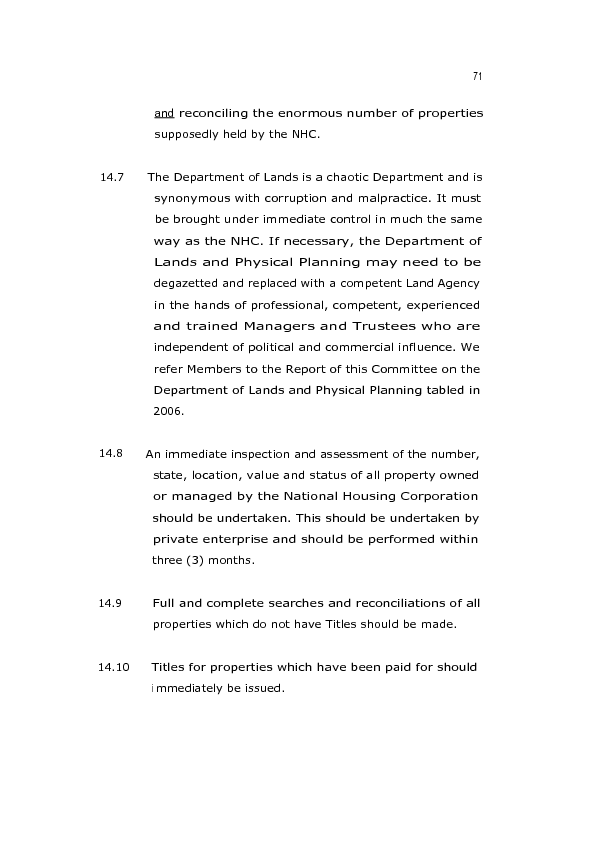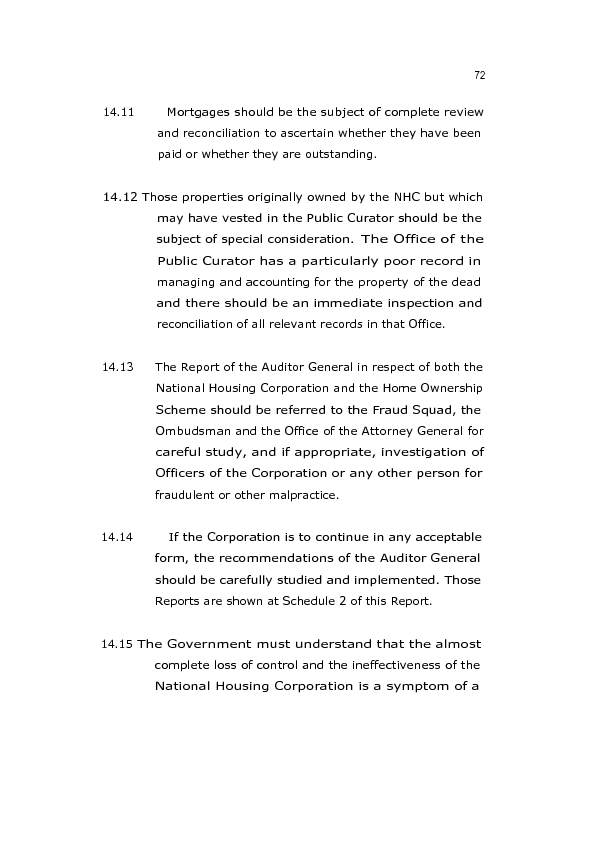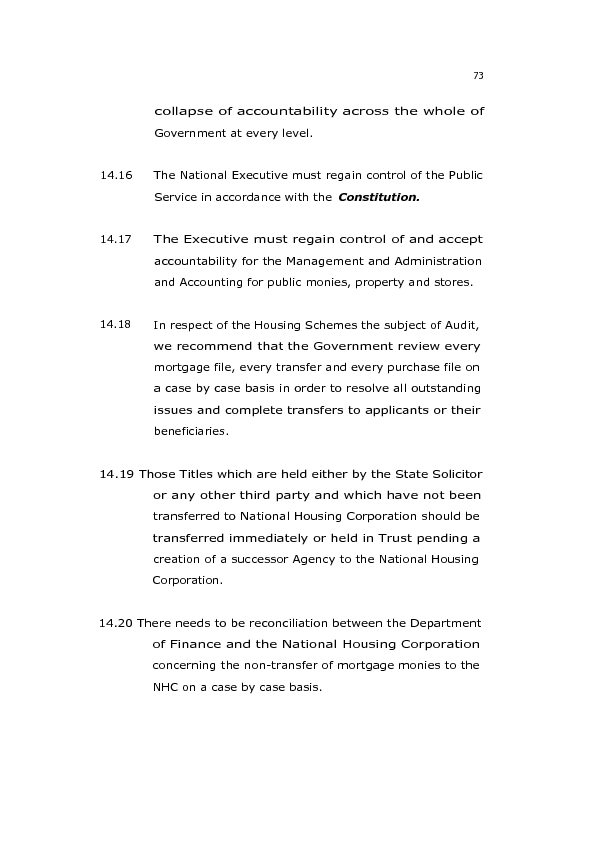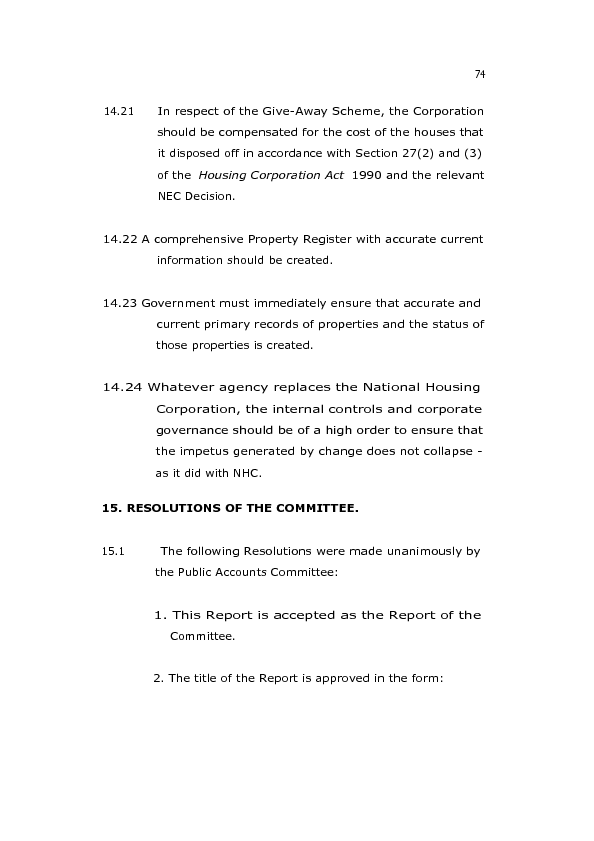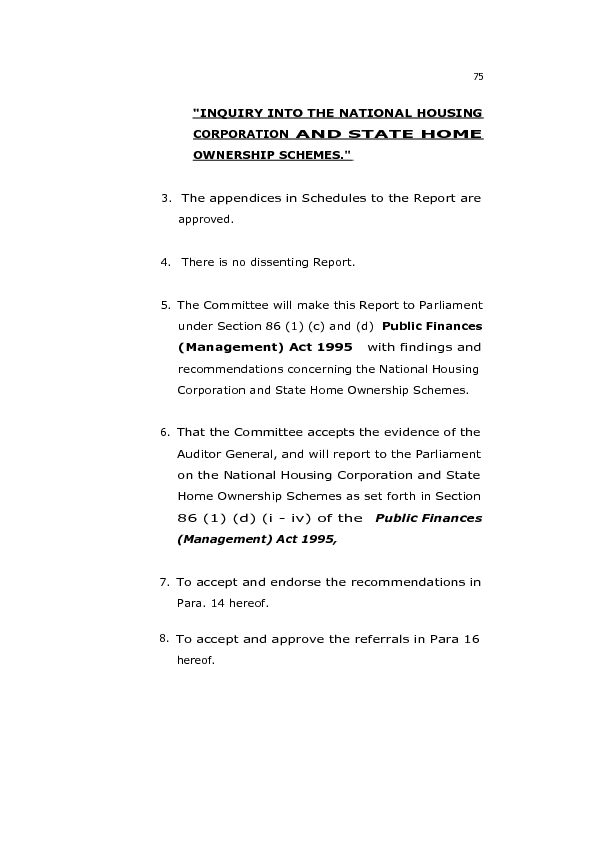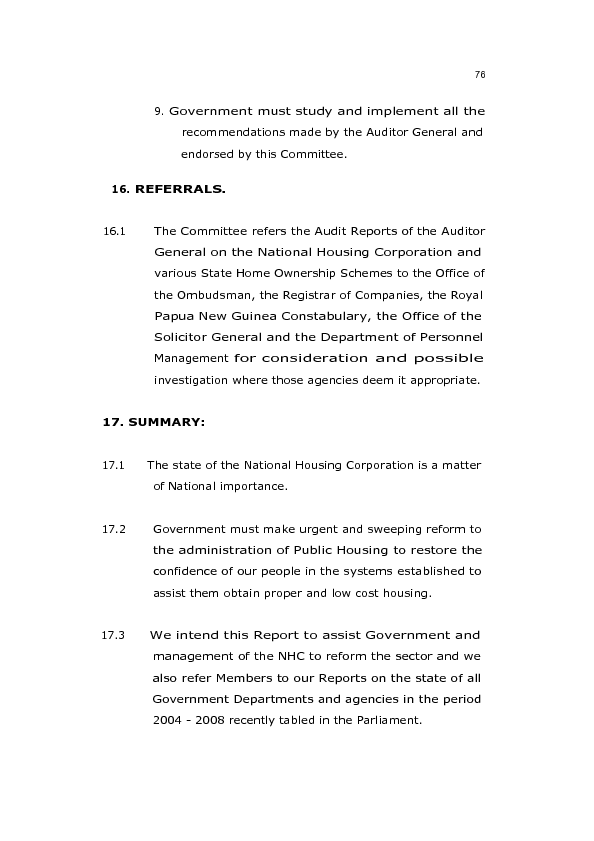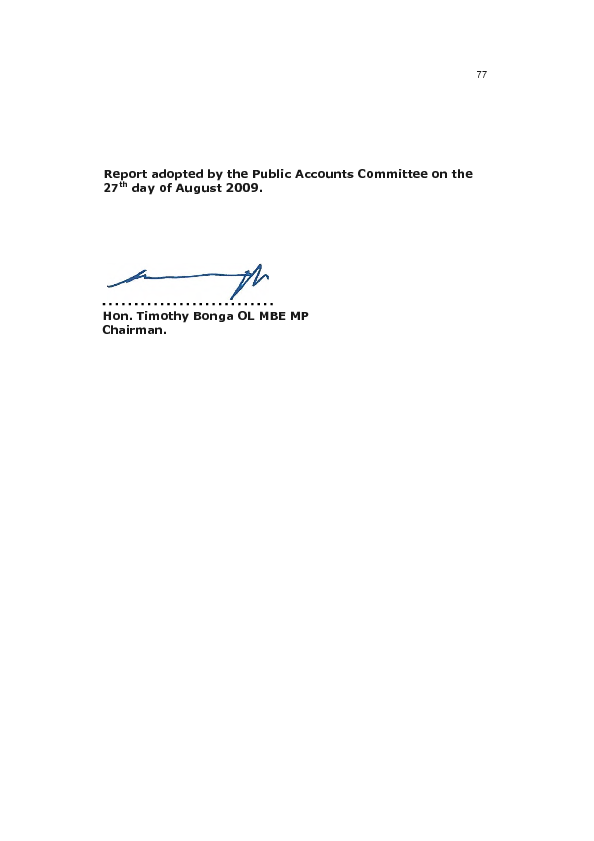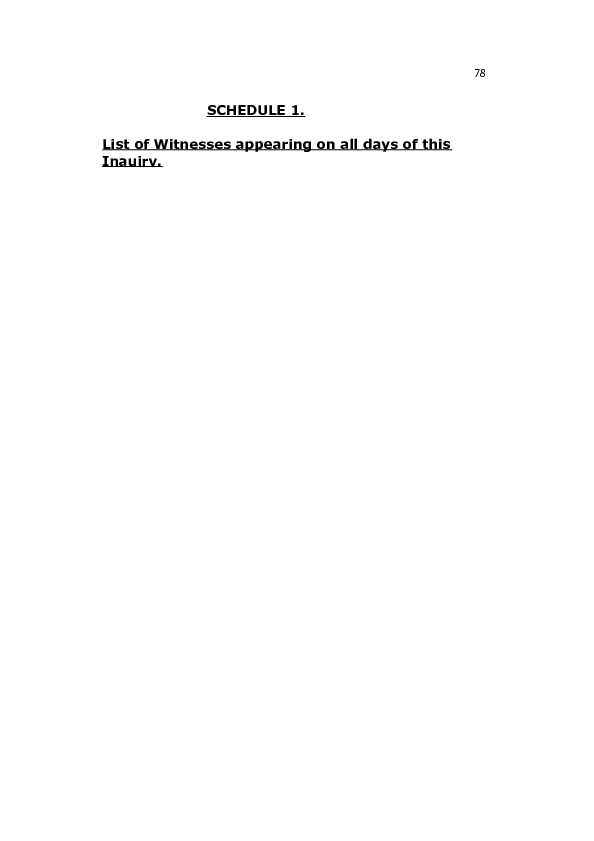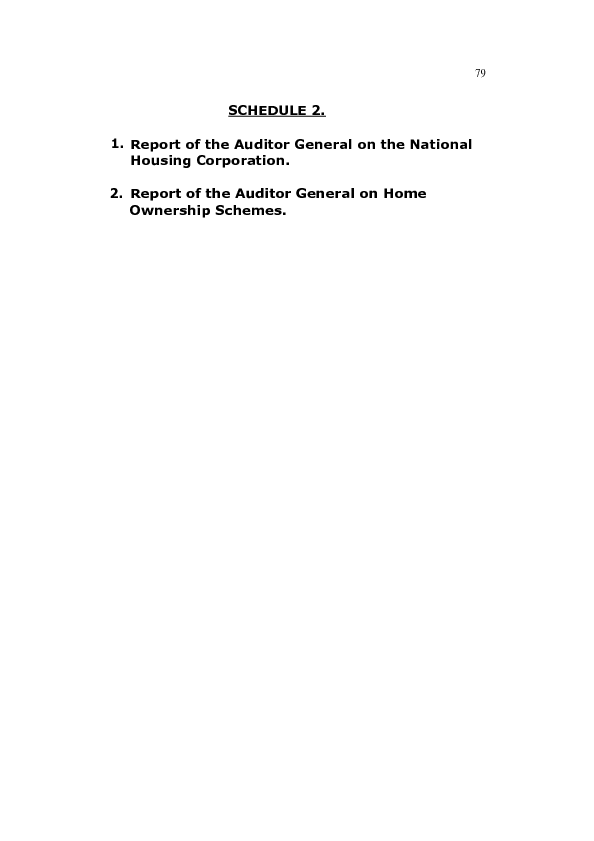Inquiry into the National Housing Corporation and State Home Ownership Schemes – Report to the National Parliament
Mentions of people and company names in this document
It is not suggested or implied that simply because a person, company or other entity is mentioned in the documents in the database that they have broken the law or otherwise acted improperly. Read our full disclaimer
Document content
-
THE NATIONAL PARLIAMENT OF PAPUA NEW GUINEA PERMANENT PARLIAMENTARY COMMITTEE ON PUBLIC ACCOUNTS Telephone: (675) 327-7783 Parliament House Facsimile: (675) 327-7474 WAIGANI, NCD Papua New Guinea e-mail:pacparliament@daltron.com.pg
CHAIRMAN’S FOREWORD
As Chairman of the Parliamentary Public Accounts Committee of Papua New Guinea, I now present the Final Report of the Public Accounts Committee into the National Housing Corporation and State Home Ownership Schemes managed by that Corporation.
The Report follows several months of Inquiry and consideration of evidence and the Committee makes certain findings and recommendations that are of immediate National importance.
The National Housing Corporation has been an insolvent and failed entity for many years. The Committee makes recommendations and findings to assist the National Parliament to understand and address failures and weaknesses in the Corporation.
I acknowledge the Reports produced and assistance given by the Office of the Auditor General and those witnesses who took the time to provide submissions and evidence to us.
I also acknowledge the attendances and hard work of the Members of the Public Accounts Committee who readily found time for Committee work from busy schedules.
I encourage all Members to read and carefully consider this Report and reflect on the state of public housing in Papua New Guinea.
Hon. Timothy Bonga OL MBE MP CHAIRMAN. 01/09/2009.
-
Page 2 of 82
-
PUBLIC ACCOUNTS COMMITTEE
INQUIRY INTO THE NATIONAL HOUSING CORPORATION AND
STATE HOME OWNERSHIP SCHEMES.
REPORT TO NATIONAL PARLIAMENT
CONTENTS
CONTENT PAGE
EXECUTIVE SUMMARY 1
INTRODUCTION 7
LIST OF ABBREVIATIONS 11
COMPOSITION OF THE COMMITTEE 11
JURISDICTION 12
PURPOSE OF INQUIRY 15
AUTHORITY TO REPORT 15
METHOD OF INQUIRY 15
PRIVILEGES AND PROTECTION OF WITNESSES 17
RELEVANT STATUTES 17
THE NATIONAL HOUSING CORPORATION 31 sT AUGUST 2008 18
CORPORATE GOVERNANCE 19
CORPORATE STRUCTURE 20
-
Page 3 of 82
-
11
HUMAN RESOURCE EFFECTIVENESS 21
BOARD OF THE CORPORATION 23
AUDIT AND OTHER SUB COMMITTEES 30
SENIOR MANAGEMENT APPOINTMENTS 32
RISK MANAGEMENT 33
COMPLIANCE TO STATUTORY REQUIREMENTS 34
STATUTORY AUDITS 36
TAX AND SUPERANNUATION REQUIREMENTS 40
REVENUE 41
PROPERTY SALES 42
CASH MANAGEMENT 47
PROPERTY TITLES 50
CONCLUSIONS 56
NATIONAL HOME OWNERSHIP SCHEMES 57
AUDIT FINDINGS 63
RECOMMENDATIONS 69
RESOLUTIONS 74
REFERRALS 76
SUMMARY 76
-
Page 4 of 82
-
THE PERMANENT PARLIAMENTARY COMMITTEE ON PUBLIC ACCOUNTS
INQUIRY INTO THE NATIONAL HOUSING
CORPORATION AND STATE HOME OWNERSHIP SCHEMES.
REPORT TO THE NATIONAL PARLIAMENT.
1. EXECUTIVE SUMMARY
1.1 The National Housing Corporation is an failed, insolvent and non performing entity – and has been for at least twenty years.
1.2 Misconduct and failure within and by the Corporation has resulted in current lawsuits of K 54 – 50 million against the Corporation and/or the State.
1.3 The National Housing Corporation’s systems of accounting and recording public monies, property and stores collapsed at least twenty years ago.
1.4 The National Housing Corporation should be wound up, the National Housing Corporation Act 1990 should be repealed and a specialized Housing Trust should be appointed from private enterprise to professionally manage the public housing sector.
-
Page 5 of 82
-
7
1.5 So deficient are the records of the various Home Ownership Schemes “managed” by the National Housing Corporation that it is unlikely that the true state of those schemes will ever be known.
1.6 It may be necessary to appoint a specialized Board to try to identify the properties subject to these schemes, the true owners, the state of any contract of sale, the state of any mortgage, the condition and value of the properties, whether the Department of Finance holds or has received any and what money by way of deduction from salary for payments of mortgages, the rightful owner or beneficiary entitled to the property and compensation which should be made to purchasers and myriad other matters.
1.7 Pending any attempt to unravel and rebuild the Corporation, its operations and the state of Housing Schemes, all managers and senior staff – particularly accountable officers – should be suspended and subject to deep inquiry concerning their respective roles in the collapse of the Corporation – in particular past Board Members.
1.8 The National Housing Corporation has failed to:
• maintain any or any adequate records of properties controlled, owned or managed by it;
-
Page 6 of 82
-
3
• manage to any acceptable standard various Home Ownership Schemes;
• comply with the Public Finances Management Act 1995 or the Financial Instructions made thereunder;
• comply or meet its obligations and duties under the National Housing Corporation Act 1990;
• properly and prudently manage its own affairs;
• manage, maintain, keep or submit financial accounts and records as required by Law;
• meet contractual and commercial obligations;
• transfer properties to rightful owners;
• identify or value properties;
• obtain State Leases for properties under its control;
• comply with Tax obligations for years;
• properly and prudently protect the position of the State and exposed the State to liability thereby;
-
Page 7 of 82
-
4
• i mplement any Corporate Plan or accounting systems adequate to the needs of the Corporation;
• perform Corporate Governance to any acceptable standard;
• maintain any or any proper lines of command and control;
• establish policies and management practices including control structures for the proper management of the NHC;
• obtain or deploy adequate resources and competent manpower;
• properly and professionally manage rental collection resulting in financial losses;
• collect debts in a proper and timely manner;
• apply to and obtain from the Department of Lands and Physical Planning lease titles for properties under its control;
• comply with procurement provisions of the Public Finances (Management) Act 1995;
• obtain approval for its organizational structure;
-
Page 8 of 82
-
5
• maintain rental properties adequately or at all;
• maintain any or any adequate control environment;
• reconcile General Ledger accounts;
• enforce the use of its Accounting Procedures Manual;
• comply with budgetary controls;
• comply with such Internal Control Policies as did exist in the Corporation;
• used an inadequate MYOB accounting system;
• maintain trade creditors properly or lawfully resulting in uncontrolled payments, double and over payments;
• maintain accurate General Ledger accounts;
• insure properties and assets thereby exposing the State to risk of loss and liability;
• i mpose expenditure limits on signatories;
• control improper dealing with properties under its control;
• prepare and submit statutory accounts.
-
Page 9 of 82
-
6
1.9 The Board of Directors of the National Housing Corporation failed to perform their duties in a proper and lawful manner.
1.10 There are no or no adequate records of Board Meetings.
1.11 The NHC failed to keep adequate staff, salary, revenue, expenditure, tax, superannuation, bank account, cash management, corporate affairs, asset, advance, motor vehicle, property purchase, property identification, property transfer and virtually all other necessary or statutory records for at least twenty years.
1.12 The Office of the Ombudsman and the Police will be provided with a copy of this Report and the Reports of the Auditor General with a recommendation that they carefully read, consider and action recommendations and investigations where they consider such action appropriate.
1.13 The Department of Finance has failed to maintain or submit records of monies received and paid to Consolidated Revenue as part payments by deduction for the purchase of properties from the State.
1.14 The National Housing Corporation tolerated failure and mismanagement and, the evidence shows, had no will to reform or change.
1.15 The National Housing Corporation, like many of our other Institutions, has suffered from political
-
Page 10 of 82
-
7
appointments of utterly inappropriate persons to positions of responsibility and trust. This must be stopped.
1.16 The conduct of the National Housing Corporation is a National disgrace and a betrayal of many thousands of our citizens who have struggled to meet their contractual obligations to the State only to find that the State failed them by not transferring property in accordance with its contractual obligations.
2. INTRODUCTION
2.1 The National Housing Commission Act was repealed by the National Housing Corporation Act 1990. The assets and li ability of the former National Housing Commission were supposedly transferred to the National Housing Corporation (“the Corporation”) in March 1990.
2.2 The principal functions of the Corporation are:
• To improve housing conditions.
• To provide adequate and suitable housing or letting to eligible persons.
• To sell houses to eligible persons.
-
Page 11 of 82
-
8
• To make advances to eligible persons and approved applicants to enable them to become owners of houses occupied by them.
• To develop residential land by way of providing adequate services for human settlement.
• To carry out and promote research or investigations into matters associated with Urban development and Human Settlements; and
• To maintain dwellings and associated buildings vested in the Corporation.
2.3 The National Housing Corporation is a wholly State- owned entity of the Government of Papua New Guinea and is supposed to operate as a commercially profit- orientated Corporation.
2.4 Although the National Housing Corporation has a Corporate Plan, it has never been implemented.
2.5 The Corporation also assumed responsibility for the conduct of Home Ownership Schemes which had been in existence for at least four decades both in the post and pre Independence era.
2.6 Originally the Housing Commission had been responsible for managing the housing needs for Public Servants and the public, and the Commissioner for Housing was responsible for granting financial
-
Page 12 of 82
-
9
assistance to the approved applicants to assist them purchase, erect or enlarge dwelling houses or to discharge mortgages on dwelling houses within the then Territory of Papua New Guinea.
2.7 After Independence, the Department of Housing was established and it managed Government Housing responsibilities for Government reserved houses especially for Contract Officers in the Public Service while the Housing Commission managed other Government Houses for Public Servants and private rentals.
2.8 In January 1990, the Department of Housing, the Housing Commission and the National Housing Commission merged and the National Housing Corporation came into existence.
2.9 The National Housing Corporation has been in a state of abject and complete failure and collapse for at least two decades.
2.10 It has failed to carry out almost any of its functions and is synonymous with corruption and incompetence.
2.11 This is particularly concerning as the entity is a Corporation and the Board and Officers of that Corporation bear onerous responsibilities to fulfill their duties – and this they have conspicuously failed to do.
-
Page 13 of 82
-
10
2.12 This Committee opened an Inquiry into the National Housing Corporation on the 24 th day of September 2008 and continued the Inquiries on the 25 th day of May 2009.
2.13 During the course of this Inquiry it became clear that the National Housing Corporation was both insolvent and almost completely non-performing.
2.14 The Committee therefore requested the Office of the Auditor General to conduct two Audits.
2.15 The first Audit was intended to examine the state of the Corporation as at the end of 2008 to assist the Committee, the Government and the current Management Team of the Corporation, to understand the extent of the Corporation’s collapse and plan for future directions.
2.16 The second Audit was a full and complete examination of the state of Home Ownership Schemes managed by the National Housing Corporation.
2.17 The Committee requested these Reports in August 2008 but did not receive them until April 2009.
2.18 The Committee immediately reconvened the Inquiry, received the evidence and directed its Secretariat to prepare this Parliamentary Report.
2.19 The Committee emphasizes to the National Parliament the dire condition of the National Housing Corporation
-
Page 14 of 82
-
11
and the almost completing incompetence and ineptitude of management over many years.
2.20 This Committee will make recommendations for the future of the National Housing Corporation but does strongly suggest that the National Parliament should address this issue immediately.
3. LIST OF ABBREVIATIONS
3.1 “PF(M)A” Public Finances (Management) Act.
3.2 “PAC” Public Accounts Committee.
3.3 “The Constitution” The Constitution of the Independent State of Papua New Guinea.
3.4 “The Committee” The Permanent Parliamentary Public Accounts Committee.
3.5 “The NHC” means the National Housing Corporation. 4. COMPOSITION OF THE COMMITTEE
4.1 The Committee which conducted this Inquiry was comprised as follows:
-
Page 15 of 82
-
12
4.2. The Chairman, Deputy Chairman and Members of the Committee were properly and lawfully appointed and empowered to sit as a Public Accounts Committee.
5. METHOD OF INQUIRY.
5.1 In this Inquiry, the Public Accounts Committee received oral and documentary evidence from the Office of the Auditor General and sought information and documents from the Departments of Finance and Treasury.
5.2 We received assistance from the National Housing Corporation.
5.3 We received considerable assistance from the Auditor General but unsatisfactory and unresponsive oral evidence from the Secretaries of both Departments.
5.4 At all times, the Committee has taken great care to enable witnesses to make full and complete representations and answers to any matter before the Committee – in particular those matters about which the Committee may make adverse findings against individuals or other entities.
5.5 The Public Accounts Committee has taken care to fully consider all responses and evidence given before the Committee.
-
Page 16 of 82
-
13
5.6 No evidence was taken on oath but full and due inquiry was made of all relevant State Agencies where the Committee considered those inquiries to be necessary.
6. JURISDICTION.
THE CONSTITUTION OF THE INDEPENDENT STATE OF PAPUA NEW GUINEA.
6.1 The Committee finds its jurisdiction firstly, pursuant to Section 216 of the Constitution of the Independent State of Papua New Guinea. That Section reads:
“216. Functions of the Committee
(1) The primary function of the Public Accounts Committee is, in accordance with an Act of the Parliament, to examine and report to the Parliament on the public accounts of Papua New Guinea and on the control of and on transaction with or concerning, the public monies and property of Papua New Guinea”.
(2) Sub-section (1) extends to any accounts, finances and property that are subject to inspection and audit by the Auditor General under Section 214 (2) … and to reports by the Auditor General under that Sub-section or Section 214 (3)…”.
6.2 Whilst considering the relevant provisions of the Constitution, the Committee has had regard to the Final Report of the Constitutional Planning
-
Page 17 of 82
-
14
Committee 1974 and been guided by or applied the stated intentions of that Committee wherever necessary.
6.3 The Public Accounts Committee has had due regard to evidence from and conclusions of the Auditor General, but has conducted its own Inquiry into matters deemed by the Committee to be of National Importance or which arise naturally from primary lines of Inquiry and which are within the jurisdiction and function of the Committee as set forth in the Constitution.
6.4 Whilst engaged in the Inquiry the Committee was guided by two definitions contained in the Constitution, which are directly relevant to Section 216 of the Constitution. They are:
“Public Accounts of Papua New Guinea” includes all accounts, books and records of, or in the custody, possession or control of, the National Executive or of a public officer relating to public property or public moneys of Papua New Guinea;”
and
“Public moneys of Papua New Guinea” includes moneys held in trust by the National Executive or a public officer in his capacity as such,
-
Page 18 of 82
-
15
whether or not they are so held for particular persons;”
Schedule 1.2 of the Constitution.
THE PUBLIC FINANCES (MANAGEMENT) ACT 1995.
6.5 The Public Accounts Committee also finds its jurisdiction to Inquire into the national Housing Corporation in Section 86 of the Public Finance (Management) Act 1995.
6.6 That Section empowers the Committee to examine each statement in any Report of the Auditor General presented to the Parliament. Reports of the Auditor General were also carefully considered by the Committee.
PERMANENT PARLIAMENTARY COMMITTEES ACT 1994:
6.7 The Committee resolved that a full Inquiry into the National Housing Corporation was a matter of National i mportance and found further jurisdiction for the Inquiry in Section 17 of the Permanent Parliamentary Committees Act 1994.
6.8 That Section provides that the Public Accounts Committee can consider any matter to be of national i mportance and worthy of Inquiry.
-
Page 19 of 82
-
16
7 PURPOSE OF THE INQUIRY.
7.2 The purpose of the Inquiry conducted by the Public Accounts Committee was to make full and complete examination of the manner in which the Government funded and resourced the Office of the Auditor General.
7.3 The purpose of the Inquiry was not to improperly pursue or criticize any person or company, but to make a constructive and informed Report to the Parliament on any changes which the Committee perceives to be necessary in the funding and resourcing of the Auditor General and any matter considered by the Committee to be worthy of report to the Parliament.
8 THE AUTHORITY TO REPORT
8.1 The Public Accounts Committee finds authority to make this Report in Section 17 of the Permanent Parliamentary Committees Act 1994 and Section 86(1) (c) and (d) (i), (ii), (iii) and (iv) and (f) of the Public Finances (Management) Act 1995.
9 METHOD OF INQUIRY
9.1 The Inquiry by the Public Accounts Committee into the funding and resourcing was a public hearing at which unsworn oral evidence was received from a small
-
Page 20 of 82
-
17
number of witnesses and documents were tabled by the Auditor General.
10. PRIVILEGES AND PROTECTION OF WITNESSES
10.1 The Public Accounts Committee has taken care to recognise and extend to all witnesses the statutory privileges and protection extended by the Public Finances (Management) Act 1995 and the Permanent Parliamentary Committees Act 1994 and the Parliamentary Powers and Privileges Act 1964.
11. RELEVANT STATUTES
11.1 The Committee was required to consider the following Statutes during the course of the Inquiry:
THE CONSTITUTION OF THE INDEPENDENT STATE OF PAPUA NEW GUINEA.
11.2 The Committee had particular regard to various Sections of the Constitution – particularly those dealing with the establishment and empowerment of the Office of the Auditor General and the funding of that Office.
-
Page 21 of 82
-
18
AUDIT ACT 1986.
11.3 The Audit Act 1986 establishes and empowers the office of the Auditor General to carry out its work of overseeing and supervising the handling of public monies, stores and property by all arms of the National Government. The Public Accounts Committee had regard to the terms of this Act during the course of this Inquiry.
11.4 The Committee received considerable assistance from the Office of the Auditor General in the course of this Inquiry.
PERMANENT PARLIAMENTARY COMMITTEES ACT 1994.
11.5 The Committee has had regard to Sections 17, 22, 23, 25, 27, and 33 of the Permanent Parliamentary Committees Act 1994 during the course of this Inquiry.
12. THE NATIONAL HOUSING CORPORATION – 31 ST AUGUST 2008.
12.1 The Auditor General has produced an interim Audit Report for the period 1 st January 2004 – 31 st August 2008 concerning the National Housing Corporation.
-
Page 22 of 82
-
19
This Committee has established that the matters outlined in that Report still exist in April 2009. A copy of the Report of the Auditor General is shown at Schedule 2 hereof.
12.2 The Audit was conducted in such a manner as to examine corporate governance, revenue, expenditure, cash management, billing and debtors, fixed assets, creditors and payables, EDP, Accounting software, statutory records, statutory accounts, policies, procedures and manuals and other areas of importance.
12.3 At the request of the Committee, the Auditor General designed his Audit and Report in such a way as to provide for future directions and recommendations for change and improvement in the administration and operation of the Corporation.
12.4 The salient findings of this Committee in respect of the current state of the National Housing Corporation are:
CORPORATE GOVERNANCE
Corporate Plan
12.5 The National Housing Corporation has a Corporate Plan for the years 2006 — 2011 and the Auditor General describes the Plan as 11— very comprehensive and well presented”,
-
Page 23 of 82
-
20
12.6 The Plan set outs strategies for all areas of the operation of the Corporation but has not been effectively implemented although they have some improvements in certain areas.
12.7 The Corporate Plan has not been implemented for a number of reasons.
12.8 The primary reason is funding constraints — the Corporation is insolvent. Other reasons include lack of manpower capacity, political interference in the Corporation’s affairs and internal management problems.
12.9 The fact that such matters can impede the introduction of a Corporate Plan (which is basic and fundamental management practice) amply demonstrates the state of collapse of the Corporation.
CORPORATE STRUCTURE
12.10 The Corporation underwent an Organizational Restructure in 2006 and that restructure had been appointed from the National Housing Commission and the Department of Housing when both amalgamated in 1990. What the situation prior to 2006 was, this Committee has been unable to ascertain.
12.11 The current structure has General Managers for each Division including Project Development, Property Management, Human Resources and Administration and Finance.
-
Page 24 of 82
-
21
12.12 All functions are centered in Port Moresby.
12.13 The administrative powers have not been decentralized to Provincial Centres and Housing Officers and their support administrative staff are involved largely with the collection of rental fees from tenants of the NHC- owned properties.
12.14 Efficient and effective credit control procedures do not exist and have not existed for years.
12.15 The Corporation needs to find a system that is efficient and effective so that performance can be measured and if there are any faults, corrective actions can be taken on a timely basis.
HUMAN RESOURCE EFFECTIVENESS
12.16 The Human Resources Division does not have a standard Operational Manual in respect of the roles and functions under its line of activities. Numerous concerns have been raised with the Management by the Auditor General, but to no avail.
12.17 Training is lacking and there are no funds to undertake such an exercise.
12.18 The absence of a standard Operational Manual has led to confusion in duties and functions of the HR Division
-
Page 25 of 82
-
22
and the Corporation cannot expect to function if it does not train its HR staff in their roles of responsibilities.
LEGAL SECTION
12.19 The Legal Section is currently staffed by a Principal Legal Officer and two support staff which includes the Secretary and Filing Clerk.
12.20 The Conveyance and Litigation Officer positions are vacant.
12.21 The Corporation has approximately K45 million – K50 million of possible lawsuits against it. If any further demonstration was needed of the complete failure and collapse of this Corporation – it is provided by the enormous amount of litigation against the Corporation – much of which arises from the illegal sale of properties and/or wrongful termination of employees.
12.22 The Auditor General also identifies poor communications between Senior Management and Divisional Heads.
12.23 Morale is poor, lines of command and control blurred or non-existent. There is no co-operation or cohesion between any arm of the Corporation and the entire chaotic mess is simply unable to function at any level.
-
Page 26 of 82
-
23
12.24 As the Auditor General points out:
“Effective communication is a key element in the smooth and effective running of an Organization and NHC is no exception. With the constant changes of Management and Divisional Heads compounded with the current in-house arguments, the effective communication system is completely tussled up (sic). When there is a breakdown in communication, delegation and implementation of tasks become difficult. This diminishes staff work ethics and devalues staff morale. Effective communication should start from the Top Management and flow down to casual employees”.
12.25 Despite the syntactical shortcomings, this Committee agrees with the finding.
12.26 Poor communication, poor morale and poor function is a clear result of poor or non-existent management.
BOARD OF THE CORPORATION
12.27 Although the Committee was aware that the Corporation had significant internal problems, we were not prepared
-
Page 27 of 82
-
24
for the findings of the Auditor General concerning the Board of Directors.
12.28 The Corporation Board consists of 9 Board Members appointed under Part II, Section 7 of the National Housing Corporation Act 1990. The Board Members are appointed by the Corporation through what should be a stringent selection process carried out by the Department of Personnel Management.
12.29 In light of the findings concerning the Corporation an i mmediate concern of this Committee is exactly how stringent that selection process really was.
12.30 We are quite certain (and evidence received from Ms Margaret Elias in another Inquiry, is directly relevant to this Inquiry into the National Housing Corporation) that obviously incompetent persons completely unsuited for positions either as Board Members or Managers are regularly appointed by the NEC across all the Public Service.
12.31 The evidence to which we refer is contained in the following quotation of transcript from our Inquiry into the keeping of the Public Accounts for 2004:
Hon. Malcolm Smith-Kela M.P.
-
Page 28 of 82
-
25
“Can you tell us your role in selecting public servants for operations within the Public Service because since we have this capacity problem. It seems to come from your Department. Can you clarify your role in the selection process?
Ms. Margaret Elias:
……. as you are aware the Department has gone through a number of intensive reforms and one of those is to do with devolution. We have devolved the powers of Human Resources mainly to all the Departments and Provincial administrators to take on the role that we do. And it is hire and fire that has now been given to all the other government agencies and delegation has been done through an instrument that has given them the powers to do so.
So in answering your question on selection, the power of selection has been given to the Departmental Heads and the Provincial Administrators.
Hon. Malcolm Smith-Kela MP:
-
Page 29 of 82
-
26
That is my concern regarding the selection of Departmental Heads.
Ms. Margaret Elias:
We are in the process …we are major stakeholders in terms of selection. Of course it does not begin and end with the Department of Personnel Management.
Hon Malcolm Smith-Kela MP
I realize that. My next question is, have you read the Auditor General’s Report? Because if you read his report for a number of years, we seem to be recycling the same people and that’s my concern and these people do not observe the Public Finances (Management) Act yet they keep getting reappointed?
Ms. Margaret Elias: With respect to you, Governor, and also the members of the Public Accounts Committee you will appreciate that the final decision rests with the NEC. (Committee emphasis.)
-
Page 30 of 82
-
27
Since 2006 there was supposed to be the introduction of the merit based system but that was not put in place until I got involved in 2006. So, we have a new merit based system in terms of the contract of employment and also the terms and conditions of employment
12.32 Board Members of the Corporation comprise 3 ex-officio members and 6 members from Professional Bodies.
12.33 The 3 ex-officio members include the National Housing Corporation Managing Director, a nominee of the Department of Finance and a nominee of the Department of Lands & Physical Planning.
12.34 The other 6 members include two members each with professional experience as a Senior Manager or Corporate Planning, one with professional expertise in Architecture and Town Planning, one experienced in Training and Industrial Relations, a representative of the National Council of Women and a representative of the National Council of Churches.
12.35 The Committee particularly requested the Auditor General to carefully consider the workings of the Board of this Corporation. The success or otherwise of any entity is a direct reflection of the quality of Management at the very top level.
-
Page 31 of 82
-
28
12.36 The Auditor General found:
• The Board Secretary does not keep resumes and other personnel or personal records of the Board Members. The Auditor General could not therefore perform his Audit functions to ascertain and report on selection and appointment processes as well as performing “fit and proper” tests on the Board Members.
This is a matter of great concern. How can this Committee even be certain that Members were properly or lawfully appointed and still properly or lawfully hold tenure?
• Eight Board Meetings were held from 2004 to the 31 st August 2008. Three meetings were held in 2007 while five were held in 2008.
• There could have been meetings in 2005 and 2006 but copies of the Minutes were simply not provided to the Auditor General.
It is a duty of every Public Servant or Officer of Government Agencies to cooperate with the Auditor General when requested to do so. This Committee can only conclude that other meetings were not held and there are no records maintained – a breach of law.
-
Page 32 of 82
-
29
• Minutes of Board Sittings are incomplete and inconsistent. The Auditor General could not therefore report on matters of importance raised in Board Meetings.
This is a very serious matter. Failure to keep proper, lawful and complete Minutes of Meeting exposes the Corporation to a risk of fraud and other irregular dealings – and we conclude that this is exactly what occurred.
• Audit found that Board Members are paid sitting allowances whenever the Board actually sits. The Chairman is paid K200 per Sitting and each Board Member is paid K150 per Sitting. They are also paid quarterly, stipend allowances of K2,437.50 (Chairman) after tax and K1381.25 for Members after tax.
• The Auditor found that Board Meetings are irregular and Minutes misplaced or not taken. Payment of allowances could not therefore be verified to the general ledger records due to unreliable accounting records.
This is very fundamental management practice which should occur in the simplest of corporate or unincorporated associations.
-
Page 33 of 82
-
30
That it did not occur in the National Housing Corporation, is a real measure of the appalling state of failure and collapse demonstrated by that entity.
• Irregular and missing Board Meeting Minutes may lead to overpayment or underpayment of Board Member allowances. In the absence of resumes of Board Members, if they are Public Servants and on the Government payroll, they may receive sitting allowances in contravention of the Public Finance (Management) Act 1995 and other applicable laws.
If the records and proceedings of the Board of the Corporation are in such a state of disarray and failure, it is hardly surprising if the rest of the Corporation reflects that chaos.
This would be serious in any Corporation but in a Corporation managing a huge property portfolio and complicated and complex Housing Schemes, it was clearly a prescription for failure and misconduct.
AUDIT AND OTHER SUB COMMITTEES
12.37 The Corporation established an Audit Committee in 2005 but no meetings have been held until 15 th October 2008. Why that Committee did not meet is unknown.
-
Page 34 of 82
-
31
12.38 There are no records available concerning the required number of sittings, the terms of reference, its composition and procedures for selection to the Committee or whether Committee Members are being paid sitting allowances or any form of allowances for serving on the Committee.
12.39 An Audit Committee is a vital tool to assist Management to perform their duties in a proper and lawful manner and to oversee controls and systems and standards of operation of any agency.
12.40 In a complex and large Corporation like the National Housing Corporation, a properly funded and resourced internal Audit Committee is essential.
12.41 Internal Auditors can also greatly assist external Auditors by performing their work properly and fully and thereby maximizing the impact of Audit inspection and recommendations and minimizing the use of Audit resources.
12.42 This Committee concludes that the failure to activate the Audit Implementation Committee for three years very largely explains the almost complete collapse of the Corporation and the clear spread of fraudulent and i mproper conduct by Corporation officers.
-
Page 35 of 82
-
32
12.43 Controls and systems have completely collapsed – and this would not have happened had the Internal Audit Committee been performing its work.
SENIOR MANAGEMENT — APPOINTMENTS
12.44 Considering the state of failure of the Corporation and the incompetent performance of Senior Officers – particularly those accountable officers responsible for compiling and submitting statutory accounts and records – the Committee fully expected adverse comments from the Auditor General on staff and senior management selection and appointment procedures.
12.45 The Auditor finds that proper recruitment processes are not effectively enforced. Some Senior Management Officers were alleged to have been recruited by methods other than approved and proper recruitment procedures and processes – and this would largely explain their incompetent performance.
12.46 All appointments to Senior Management positions should strictly follow a standard recruitment procedure in consultation with the Department of Personnel Management.
12.47 Recruitment of Senior Management Officers out of the standard recruitment procedures is a breach of the
-
Page 36 of 82
-
33
system, a breach of law, practice, procedure and direction and results in a total breakdown of controls.
12.48 It is perfectly clear to this Committee that political patronage and appointment on grounds other than merit has characterized the appointment of Senior Managers to the Corporation for many years.
12.49 This has led to incompetent officers been recruited which results in low productivity, breakdown in trust and teamwork, loss of command and control and a Corporation which was quite prepared to conduct itself unlawfully for many years in direct defiance of its clear role and importance in National development and service delivery.
RISK MANAGEMENT — INSURANCE COVER
12.50 The Auditor General reports that assets owned by NHC in the form of properties and buildings which are currently rented to lower-medium income earners in Papua New Guinea are not insured for possible losses. Only Corporation motor vehicles were insured and then only for Third Party Insurance.
12.51 This is a matter of great concern to the Committee and Management of the Corporation – or its successor entity – should take proper steps to adequately and fully insure State assets.
-
Page 37 of 82
-
34
COMPLIANCE TO STATUTORY REQUIREMENTS – NHC ACT REQUIREMENTS AND RETURNS
12.52 The National Housing Corporation has not complied with the Income Tax Rules and Regulations since 1988.
12.53 Section 26 of the National Housing Corporation Act 1990 renders the Corporation subject to the Income Tax Act in respect of income from property operations.
12.54 In 2006, the Internal Revenue Commission issued proceedings against the National Housing Corporation for failure to comply with the Income Tax Rules and Regulations and that move apparently prompted the Corporation to engage a Tax Consultant to determine the tax position of the Corporation.
12.55 The Consultant did not complete his work but left when the General Manager for Finance was terminated. The matter is still unattended and may well be a very considerable contingent liability of the Corporation which should be dealt with immediately.
12.56 Even if that litigation is settled, there remains the continuing failure to comply with the Income Tax Act since 2006 and this Committee can only repeat that if any indication was needed of the utter incompetence and indifference of officers of this Corporation – failure to comply with the Tax Regulations provides it.
-
Page 38 of 82
-
35
PUBLIC FINANCE (MANAGEMENT) ACT 1995
12.57 The Public Finance (Management) Act 1995 has been breached almost on a daily basis by the Corporation.
12.58 The Auditor General reports and this Committee find that breaches of Law include almost all operational aspects of the Corporation which culminated in the removal of yet another Managing Director in 2008.
12.59 There are instances of the Act been breached every year in the Reports of the Auditor General, but the Auditor General concludes:
“There are many instances of (PFMA) being breached, but the matters have never been reported for remedial action because of varying reasons including losing jobs, party tothe deal or never detected. It is strongly urged that the staff be familiar with the provisions of the Act as they are a Government body that is subject to the Act. In so doing any malpractice in breach of the Act will be reported as the staff are aware of the laws”.
12.60 That statement of principle is somewhat wishful. Every agency of Government conducts itself in complete defiance of many of the requirements of the Public
-
Page 39 of 82
-
36
Finances (Management) Act 1995 and not one National Government Department obeys all requirements.
12.61 However, in respect of a commercial Corporation, the failure to obey the law takes a slightly different and more serious connotation.
12.62 Members of the Board and Senior Officers of the Department should be reported, investigated and prosecuted wherever these breaches are found. If this had been done, the Corporation may not have reached the stage of abject collapse that it has.
12.63 This Committee intends to make full referrals to the Fraud Squad and to the Ombudsman at the conclusion of this Report
STATUTORY AUDITS Statutory Accounts
12.64 The Statutory Accounts of the Corporation for the years ending 31 st December 2004 – 31 st December 2007 are still outstanding.
12.65 It is noted that the statutory accounts have not been prepared for years 2005 – 2007.
-
Page 40 of 82
-
37
12.66 This Committee has significant doubts that proper and reliable accounts could be prepared in any event as the recording and accounting systems in the Corporation are effectively non-existent.
12.67 By the Auditor General’s Part 2 Report of 2005, only the Financial Statements for the years 2002 and 2003 had been submitted.
12.68 By the 2005 Part 2 Reports, the 2003 and 2004 Financial Statements were still being audited. In 2005, the Auditor General’s Report was four years out of date.
12.69 The Part 2 Report of the Auditor General for the financial year 2006 made report on the National Housing Corporation for 2002 and the Financial Statements for 2003 and 2004 was still being audited.
12.70 It is this Committee’s conclusion that one major contributing factor to the breakdown of systems within the National Housing Corporation may well be the failure of the Auditor General to conduct his work in a ti mely and proper fashion – as he is required to do.
12.70 This Committee will appreciate the funding and resources constraints faced by the Auditor General, but when an entity like the National Housing Corporation is
-
Page 41 of 82
-
38
so patently in a state of collapse, the Auditor Genera should give priority to that entity.
12.71 In any event, the latest evidence prior to the 2008 Audit, the Auditor General made the following findings:
• Li mitations of Scope:
Due to limitations on the scope of his work, the Auditor General could not form an opinion on the financial statements of the National Housing Corporation.
• Cash and Bank Balances were not supported by appropriate documentary evidence.
• Fixed Assets – Due to the state of Corporation records, the Auditor could not perform alternative Audit procedures to form an opinion as to the completeness, existence and valuation of fixed assets
• Rental Debtors – Rental Debtors were, in 2002, K 73,584,702. Sundry debtors were K 608,749. There was no appropriate documentary evidence supporting these figures
-
Page 42 of 82
-
39
• Sundry Creditors were an incredible K 103,151,721 in 2002. There were no records to support these figures.
• An advance from the Government in the sum of K 7,779,200 – there was no documentary evidence to support these balances
• Owed to the Department of Lands and Physical Planning K 4,757,200 – there was no documentary evidence to support this balance
• Government equity of K 27,668,800 – there were no records of an allotment of shares in the name of the State, no records to confirm from the Department of Finance that these amounts relate to equity contributions rather than advances
• Total revenue K 10,116,825 – there was no documentation to support the recorded amounts of revenue and expenditures
• The Corporation financial statements did not include a Cash Flow Statement and Statement of changes in equity and did not comply with the International Accounting Standards
• The Corporation liabilities exceeded assets by K 25,276,514 and the Auditor finds that the
-
Page 43 of 82
-
40
Corporation may not be a going concern. Incredibly, the financial statements and notes did not disclose this fact
• The accounting systems internal control environment at the Housing Corporation were severely deficient
• Ineffective management information systems, inexperienced and/or incompetent staff and inadequate financial reporting contributed to undue delay in preparing financial statements
• There was no evidence of Management’s review of financial statements and related records. Reports that were produced were inaccurate and Management could not substantiate most of the balances in the general ledger
TAXES AND SUPERANNUATION CONTRIBUTIONS
12.72 The Corporation owes approximately K7 million in unremitted Group Tax and POSF Remittances are also pending. Reconciliations for both items were not made on a timely basis and there is virtually no historical record upon which Management could rely to make these payments.
-
Page 44 of 82
-
41
12.73 The Corporation has conducted its business for years in complete disregard of the Income Tax Act and there is no excuse for that failure.
12.74 Senior Managers and Members of the Board should themselves be surcharged in relation to these failures and may well face personal liability for failing to comply with the requirements of law.
12.75 POSF contributions are usually deducted straight from the payee’s payroll and remittances should be made i mmediately. This has not occurred and NHC and the individual officers and Directors of the Corporation may be exposed personal liability for these failures.
REVENUE
12.76 The main source of revenue for the Corporation is the renting of properties and houses to low/medium income earners in the country.
12.77 The Corporation also receives revenue from selling properties and land and receives grants from the Government.
12.78 Why Government continues to fund this failed entity is beyond this Committee’s understanding.
-
Page 45 of 82
-
42
12.79 The Corporation has incomplete records, unreliable property registers, no or no adequate records in relation to sales, debtors and cash receipts and the Auditor can perform no real effective Audit in these areas.
PROPERTY SALES
12.80 The Auditor General reports that controls and systems for the sale of properties have been abused for personal gain in collaboration with outside interested parties.
12.81 There are many lawsuits against the NHC pending in the National Court of Justice. More than half the outstanding cases relate to the illegal sale of properties involving a few officers of the Corporation for personal gain.
12.82 The Auditor General also found that properties have been sold without the transfer of actual Title Deeds or are yet to be transferred to tenants who have paid for the properties.
12.83 The Auditor General makes the following finding – a finding which this Committee endorses:
“The NHC has failed miserably in not setting standards and procedures for selling out
-
Page 46 of 82
-
43
Corporation-owned land and properties. All properties should have a Title Deed and proper Contract of Sale Instrument should be executed to avoid further lawsuits being perpetrated against the Corporation. The Legal Division is very much aware that most of the properties have been sold through fraudulent means and the Division is fighting in Court to reclaim those properties”.
12.84 The true state of the corruption and failure within this Corporation will become clear later in this Report when we consider the Report of the Auditor General on the Home Ownership Scheme managed by the National Housing Corporation.
REVENUE GENERATION SYSTEM
12.85 Revenue collection systems have not been effectively monitored or implemented.
12.86 The Billing system for revenue collection has been very poor and that there is a total breakdown in communication between the Billing Section and the Finance Section.
12.87 The Auditor General finds that currently almost half the billings are not collective or reconciled against cash receipts.
-
Page 47 of 82
-
44
12.88 An equally chaotic situation exists with Credit Control and Cash Collection. The Property Section of the Corporation prepares invoices and also acts as a Credit Controller.
12.89 These functions are not segregated as they should be. There is a clear risk of one person or Section preparing bills and collecting debts which could and should be minimized.
12.90 There is no effective and efficient credit control and cash collection process.
12.91 There are no proper and complete registers or records, accounts or reports.
12.92 Control of cash collection is ineffective and inefficient as the property register serves as the basis for complete and accurate recording of debts – but if it needs help inaccurate and ineffective.
EXPENDITURE
12.93 The Auditor General found that while all payments made by NHC are subject to Budget control those processes were not always followed because Senior Managers intentionally override and direct on unbudgeted expenditure.
-
Page 48 of 82
-
45
12.94 This is nothing more or less than misappropriation (at best).
12.95 The effective overriding expenditure controls is that the Corporation incurs unbudgeted costs which can adversely impact on the cashflow of NHC and there are no accurate and proper records or control of expenditure from which subsequent yearly Budgets could be accurately calculated.
12.96 Moreover, such a practice is an open invitation to fraud and misappropriation and that is exactly what has occurred within this Corporation.
SALARY AND WAGES
12.97 The Corporation was using an old version of “CHRIS 5” Payroll Software. The use of the older version requires intense manual countersigning and has limited functions. It is incapable of collecting required payroll data and can lead to miscalculations or functions not properly taken up.
12.98 Payroll, Human Resources, Advances, Long Service Leave, Insurance and Taxation records were in a state of failure and the Corporation needs to urgently and i mmediately rebuild their systems of salary and wages recording and processing.
-
Page 49 of 82
-
46
12.99 Further, Long Service Leave accruals were never provided in the accounting records of the Corporation. The Human Resources Division does not have staff records relating to Long Service Leave and even though payments have been made to staff, how the calculations and accounting entries were put forward in the general ledger system raises questions on recognition and accuracy.
12.100 In short, recording of Long Service Leave and almost all other aspects of Human Resources and Payroll practices were unreliable, ineffective, outdated and inadequate.
TENDERS AND TENDERING PROCEDURES.
12.101 The Corporation has a Tender Committee but it consists of Senior Managers and the Auditor General finds that Tender processes and procedures were abused.
12.102 This Committee is pleased to report that the new Board of Management of the Corporation has included nominees of other Government Departments as Members of the Committee and attempting to become more transparent and to exercise sound corporate governance.
12.103 The Tender Committee now consists of the Department of National Planning Nominee, MD NHC, Department of Finance Nominee, State Solicitor Nominee, General
-
Page 50 of 82
-
47
Manager, Projects – NHC, Principal Legal Officer – NHC, General Manager – Finance and IT – NHC.
12.104 The Tender Committee carries out evaluation, rating of the Tenders and making recommendations to the NHC Board of Directors through Management.
12.105 This, at least, is a start in the right direction and this Committee will revisit this issue in later years to ascertain the progress obtained.
CASH MANAGEMENT
12.106 The Auditor General finds the following flaws and weaknesses:
• In recent times, bank accounts have become properly reconciled – with the notable exception of the Minister’s Bank Accounts.
Why an insolvent Corporation should have a Ministerial Bank Account, is unknown. Moreover, why that important account is not reconciled was not explained.
Further, the Minister’s account is not taken up in the Corporation’s main accounting system and thereby appears to be kept a secret from the Management and the Auditors.
-
Page 51 of 82
-
48
Whatever the reason, it is totally unsatisfactory and this Committee will make immediate recommendations to bring that account within the main accounting procedures and systems of the Corporation.
• There is no set limit for financial delegates to approve limits of expenditure and this poses a high risk of fraud. It is also a breach of the Public Finances (Management) Act.
. Incorrect codes were applied to tenants payroll deductions resulting in significant funds being remitted to the Finance Department. All Public Servants renting NHC properties should be noted to the correct tenant codes. Coding to wrong account codes has resulted in monies owed to the NHC not being released by the Finance Department and has deprived the Corporation of its source of revenue.
o The NHC does not have proper controls and systems in place for effective and efficient management and co-ordination of tenancy variation agreements.
• Lack of control and systems result in non-collection of arrears from some accounts and this has an adverse impact on cashflow of the Corporation.
• There is no control over advances. Advances are made to staff against the terms of the Public
-
Page 52 of 82
-
49
Finances (Management) Act. Repayment is not obtained and second advances are made when earlier advances are still outstanding.
• There are substantial amounts of money in a Suspense Account used to credit payments which are not identified, to respective debtor accounts. This account should be immediately reconciled to establish the proper debtors account in the main accounting system.
• There is no complete fixed assets register. Assets other than properties are maintained on the spread sheet and are therefore not accounted for.
• There is ineffective maintenance of a Properties Register and this leads to inaccurate billing and incomplete and inaccurate knowledge of assets, their values or state.
• There is no Log Book to monitor the use of motor vehicles.
• There is no physical variation of Fixed Assets especially houses and buildings. Indeed this is not possible in the absence of an accurate and complete fixed asset and property register.
• The absence of adequate registers opens the possibility of theft and fraud and inaccurate valuations reported in the financial accounts.
-
Page 53 of 82
-
50
12.106 NHC properties are not valued – even though the Corporation has a valuer on staff.
12.107 There is no valuation report prepared or presented to the Auditor. In the absence of such a Register, properties can be undervalued and sold out cheaply thereby causing a loss of revenue.
12.108 The Corporation does not even know the number of properties which it holds nationwide, their state of repair or, in most cases, who now owns them.
PROPERTY TITLES
12.109 The issue of State Leases for properties purchased by our citizens is completely inadequate. The Lands Department works at its own pace when and if it feels that it should.
12.110 The Auditor found many tenants who have settled their debts are unable to get Title Deeds because the Corporation does not have them.
12.111 They do not have them, in many cases, because the Department of Lands has not issued State Leases – and this situation has prevailed for decades.
-
Page 54 of 82
-
51
12.112 This Committee has wide experience of the Department of Lands. It is a non-performing Department which has long ago lost sight of its true purpose. In its allocation of and dealings with property it is quite prepared to act at its own pace, regardless of law or the interest of our citizens.
12.113 The Corporation has failed to obtain State Leases as it should and has significantly disadvantaged our citizens who have worked hard and paid their mortgage in an honest and industrious fashion expecting to reap the benefits of Home Ownership thereby.
12.114 This failure has led to other problems. The delay in the release of Title Deeds may lead to over-deduction of a client’s account, duplication of Titles or at least allocation of Titles and fraudulent acquisition of property by undeserving and non-entitled persons.
CREDITORS AND PAYABLES
12.115 Records of Trade Creditors Accounts are extremely poor. The reasons for this are varied and include incompetence, lack of knowledge, lack of knowledge of computer systems, lack of understanding of basic accounting principles or a breakdown in communication and lack of co-ordination and supervision of staff members.
-
Page 55 of 82
-
52
12.116 Financial statements have been misrepresented as a result of these failures, errors carried forward and possible overpayment or double payments have been made.
12.117 General Ledger Accounts are inaccurate and unreliable and creditor reconciliations, like all other general ledger accounts, are not reconciled on a regular basis.
12.118 This obviously will result in inaccurate and unreliable information and provides an opportunity for creditors to claim for bogus payments and means that the Corporation has no real or reliable control over its cashflows or payments.
12.119 Control systems over Computer systems are not maintained and unauthorized access and possible manipulation of data may result. Senior Officers do not regularly check the work of responsible officers and no checks or balances were performed on a regular basis to minimize the opportunities for manipulation and distortion of data.
12.120 Backups are not done on a regular basis and failure to keep these backup files exposes the Corporation data to loss or manipulation.
12.121 The Auditor General finds that the MYOB Accounting system used to record financial transactions is
-
Page 56 of 82
-
53
inadequate to capture all of the NHC’s transactions given the nature of its operations and volume of transactions involved.
12.122 It is recommended that the Corporation adapt a system capable of capturing all transaction and records and this Committee fully endorses that recommendation.
STATUTORY RECORDS
12.123 The Auditor noted that incomplete records of Board and Committee Meetings were maintained by the NHC. Minutes were not properly maintained or kept, Minutes of some Meetings were not made at all and a proper Register for Minutes or other accountable documents were not maintained.
12.124 Careless and inept record maintenance is completely unacceptable in a Corporation of this importance and size.
STATUTORY ACCOUNTS
12.125 International Accounting Standards are not properly followed in the preparation of Financial Reports and General Ledger Accounts are not reconciled on a regular basis.
-
Page 57 of 82
-
54
12.126 This Committee was told that, as of September 2008, the Manager, Finance Administration with the help of the Financial Accountant and other Account staff are working on reconciling the General Ledger Account balances to rectify the numbers so that complete and accurate balances are reflected in the accounts.
12.127 We encourage Management in this endeavour but recommend that routine reconciliations of the general ledger accounts must be undertaken on a regular basis as unreliable general ledger balances mean inaccurate and unreliable general ledger and financial reports.
POLICIES, PROCEDURES AND MANUALS
12.128 Although the Corporation has an Accounting Procedures Manual, it is not used by the Finance Department Division in carrying out their respective duties.
12.129 If there is a Manual, it should be known to and used by the entire staff and the fact that this has not occurred clearly shows incompetent and inept management and a complete lack of lines of command and control within the Finance Division.
12.130 Although the Corporation does have internal control policies and procedures, they are not enforced and therefore not effective in producing proper and desired outcomes and management efficiencies.
-
Page 58 of 82
-
55
12.131 As the Auditor General comments:
“Non compliance to internal controls and procedures can have very serious negative impacts on the operations of the Organization. Total breakdown in controls and procedures may result in the collapse of the Corporation”.
12.132 This Committee goes further.
12.133 Total breakdowns in controls and procedures have resulted in the collapse of the Corporation many years ago. Budget control procedures were in existence but not complied with. Unbudgeted expenditure, poor recording of revenue and an almost complete lack of control over finances has reduced the Corporation to an ineffective shell. It is incapable of making statutory records or keeping proper accounts of its own affairs.
12.134 Although the National Housing Corporation is not alone in these failures (they characterize almost every Government Agency) there is less excuse in a profit oriented Corporation of the size and importance of the NHC.
12.135 The obvious and the inevitable result of this chaotic situation is that the Corporation is, annually, faced with
-
Page 59 of 82
-
56
cashflow problems which have led to a downward spiral resulting inevitably in insolvency.
CONCLUSIONS.
12.136 As at the end of 2008, the National Housing Corporation was, in every area of endeavour, a failed Corporation and should have been wound up years ago.
12.137 The Corporation is currently insolvent and has been for many years. Audits are hopelessly out of date and the true state of the Corporation and the extent of malpractice, misappropriation and fraud within the Corporation were hidden behind a veil of secrecy created by the simple expedient of failing to produce reliable or accurate financial records and a failure by the Auditor General and any other oversight agency to perform timely Audits on the Corporation.
12.138 Now that the situation is clearly known, we will be making certain recommendations concerning the future of this Corporation – principal amongst those recommendations is the inevitable winding up of the Corporation and replacement with a professionally staffed Housing Trust Agency run by experienced Managers and Trustees fitted and suited for their jobs by background training, experience and qualifications.
-
Page 60 of 82
-
57
12.139 This Committee now reports on the state of the National Home Ownership Scheme managed by the National Housing Corporation
13. NATIONAL HOME OWNERSHIP SCHEMES
INTRODUCTION
13.1 There have been six National Government Home Ownership Schemes over a period of forty (40) years. They have been:
1. Advance Scheme – mid 1960 to early 1980s;
2. Morgan Scheme – 1979 to 1985;
3. Government Sell-Off Scheme – 1986;
4. Give Away Scheme – 1992 – 2006;
5. Rental Purchase Scheme commenced in 1970s and still in operation;
6. Cash Sales – Commenced in the 1980s and still in operation.
13.2 Therefore the Corporation’s own Home Ownership Sales Schemes, the National Home Ownership Scheme and
-
Page 61 of 82
-
58
the Staff National Home Ownership Scheme are still in operation.
THE EXAMINATION BY THE AUDITOR GENERAL
13.3 In September 2008, the Public Accounts Committee requested the Auditor General to undertake an Audit of the National Home Ownership Scheme.
13.4 That request was made in the course of an Inquiry into the National Housing Corporation and the Auditor General acceded to the request.
13.5 On the 19 th March 2009, the Auditor General made his Report and on the 15 th April 2009 the National Housing Corporation gave its response to the findings of the Auditor General.
13.6 This Committee has had careful regard to the response of the National Housing Corporation and found that despite the damning findings of the Auditor General, the National Housing Corporation basically agreed with all findings and recommendations.
13.8 Relevant explanation related to the Home Ownership Schemes were made and we record the comments as a precursor to examining the Audit findings.
13.9 According to the National Housing Corporation:
-
Page 62 of 82
-
59
Advance Scheme
13.10 This Scheme is still managed by the NHC. Some of the Titles are yet to be transferred to purchasers under the Advance Scheme. The Scheme ended nearly thirty (30) years ago and yet there are still Titles to be transferred.
Morgan Scheme
13.11 This Scheme is still managed by NHC as many Titles under the Morgan Scheme are yet to be transferred to purchasers. Once again, this Scheme finished nearly thirty (30) years ago and yet there are still Titles not transferred.
Government Sell-Off Scheme
13.12 This Scheme is still in operation and managed by the NHC. There are many purchasers who have completed their payments but have received no Title.
Give Away Scheme
13.13 This is still in operation. The Give Away Scheme is the only Scheme with clear records of purchases, records of payments, conveyance and Land Title Transfer.
-
Page 63 of 82
-
60
Rental Purchase Scheme
13.14 The term of the Rental Purchase Scheme has now expired.
Cash Sales
13.15 The maximum terms of purchase under this Scheme was five years and records are reasonably good.
National Home Ownership Scheme
13.16 Most of the properties concerned have expired mortgages pending identification and transfer of Titles.
Staff Home Ownership Scheme
13.17 Expired mortgages need to be identified and Title Transfers to be effected.
13.18 This Committee is pleased with the attitude of the National Housing Corporation, in that it admitted its failure.
13.19 This Committee almost always meets with denial, disingenuous answers, promises of improvement and grand plans and projects for reform in every Government Department and Agency that we have
-
Page 64 of 82
-
61
examined, but very rarely do we find honest and frank acceptance of failure.
13.20 Such acceptance is the basis for improvement and we can only conclude that the new Management Team at the National Housing Corporation may have grasped that concept.
13.21 In light of the findings of the Auditor concerning Home Ownership Schemes, Management of the Corporation could do little else but accept the dire picture which emerged.
AUDITOR’S REPORT
13.22 A copy of the Report of the Auditor General on the Home Ownership Schemes administered by the National Housing Corporation is shown in Schedule 2 to this Report.
13.23 The Auditor examined the Management of the Home Ownership Scheme and sought to ascertain the following:
• The number of houses transferred to the NHC;
• The number of houses owned by the NHC;
• The number of houses transferred to the public;
-
Page 65 of 82
-
62
• The state of the Contracts with Homeowners; and
• The number of house transfers still pending.
13.24 The Auditor General found that Management information concerning these Schemes was both unreliable and contradictory. The Auditor General cannot assure the validity of the data presented in his Report, but reproduces information received from the NHC.
13.25 This Committee will not examine the Audit Report in detail – Members can read the Report at their leisure. However, we do propose to address the Audit findings as they present a picture of a miserably inept performance in a crucially important aspect of our National Development and, in human terms, failures which impact directly on the lives of our citizens.
13.26 We remind Members that every one of the thousands of properties the subject of this Report to the National Parliament, represents a family who presumably worked hard and fulfilled their side of the a Contract to purchase a property from the State.
13.27 The same conscientious, honesty cannot be reported on the part of the National Housing Corporation or its predecessors.
-
Page 66 of 82
-
63
AUDIT FINDINGS
13.28 The Auditor General makes the following findings, which are endorsed and accepted by this Committee.
13.29 In its Management of the Home Ownership Schemes established by the Government of Papua New Guinea for the benefit of our citizens, the NHC failed to:
• establish essential policies and practices, including the establishment of control structures, for the effective operation of the NHC;
• secure/generate sufficient and appropriate resources for the NHC to operate effectively.
• manage the details of rental properties resulting in losses of revenue;
• conduct a stocktake of properties resulting in properties not being recorded in data bases;
• finalise the transfer of properties to approved tenants under the various Schemes despite the contractual terms being satisfied;
• maintain proper accounting records, documentation and management information systems in relation to properties under the control of the Corporation;
-
Page 67 of 82
-
64
• maintain comprehensive documentation of each scheme;
• fully and accurately value the properties managed by the Corporation;
• apply to the Department of Lands and Physical Planning to obtain Lease titles for the properties for which no lease was issued;
• li aise with the State Solicitor and obtain the listing of Lease titles of the properties which were provided to the State Solicitor as custodian for the State under the Morgan Scheme and the Government Sell Off Scheme;
• confirm with the Department of Finance the amount of the mortgage rental monies collected from public servant tenants and credited to Consolidated Revenue and how much should be transferred to NHC;
• discuss with the Department of Finance the amount of compensation for the Give Away Scheme as approved by the NEC;
• determine the exact number of houses that were managed by the Department of Housing and ascertain the status and ownership of those properties;
-
Page 68 of 82
-
65
• comply with the procurement requirements of the PF(M)A by calling tenders for new projects without approval from the Central Tenders and Supply Board.
• seek approval from the Department of Personnel Management for the organizational structure as required by the Salaries and Conditions Monitoring Committee Act 1988.
• maintain rental properties.
13.30 This Committee finds the following facts concerning management of the various Home Ownership Schemes:
• Between 9122 and 11,390 houses were transferred to the NHC and its predecessors, excluding the houses yet to be identified but which were managed by the Department of Housing;
• Up to 383 houses are still owned by NHC;
• Between 2802 and 7535 houses have been transferred to tenants;
• Between 127 and 7,716 houses are still to be transferred;
• Most of these homes have not been transferred due to:
-
Page 69 of 82
-
66
Mortgagees have not paid the full amount of the sale price;
> The NHC has not reviewed the status of the files of mortgages of applicants who had paid the contract amount in full and are waiting for the transfer to be completed by NHC;
j,, As the rental/mortgage amount was deducted by the Department of Finance and not released to the NHC, the NHC refused to transfer the titles until mortgage money was transferred;
`- Properties under the Give Away Scheme are pending compensation from the Department of Finance before they are transferred.
13.31 The evidence clearly shows that the NHC has not fulfilled its responsibilities to properly and lawfully manage the Home Ownership Schemes as required.
13.32 There are inadequate records, inadequate accounts, inadequate communication with Departments of Government and inadequate care and concern for lawful discharge of duty.
13.33 So complete is the incompetent and derelict management of these Schemes that the Auditor General concludes:
-
Page 70 of 82
-
67
“It is unlikely that complete information about the home ownership schemes will ever be available given the poor record keeping over 40 years”
13.34 The evident failure, ineptitude, incompetence and dishonesty is a matter of national shame.
13.35 We can only assume that many of our citizens who worked hard and paid their mortgages have probably died without the benefit of Transfer and their descendants or beneficiaries are in the same position.
13.36 We can also assume that as a result of malpractice in the Corporation and the miserable failure of management to keep proper and adequate records, persons entitled to properties may have been evicted, persons entitled to properties may have onsold those properties, purchasers of properties who bought in good faith may not have title, properties have been illegally and unlawfully obtained, damaged, sold, destroyed or otherwise removed without the knowledge of the NHC and with no records thereof.
13.37 All these findings beg the inevitable question – how were such persons ever placed in charge of a Corporation in the first place? How could this situation have continued for so long despite warnings by the Auditor General? Why did Government not take action to rectify this
-
Page 71 of 82
-
68
dreadful situation? What were the oversight agencies doing for forty years?
13.38 Once again this Committee can only conclude that there is a culture of impunity attending almost all aspects of governance in Papua New Guinea accompanied by a complete loss of central control.
13.39 The Public Service and Government Agencies (including the NHC) are uncontrolled and uncontrollable and act just as they please with public money, property and stores as a result of a failure by the National Parliament and the Executive to fulfill their Constitutional roles.
13.40 These failings have been attended by a collapse in the efficiency or even the existence of Law Enforcement and oversight agencies which has allowed such a dreadful situation to flourish.
13.41 The National Housing Corporation is not the only entity in this situation. So complete is the collapse of public accountability that not one Department or Agency of Government complies with the requirements of the Public Finances (Management) Act, Appropriation Act or the Constitution.
13.42 We intend to make very detailed recommendations as to the future of the National Housing Corporation at the conclusion of this Report, but we can only again
-
Page 72 of 82
-
69
recommend that Government must i mmediately take control of this Corporation and all State assets which it was supposed to have been controlled or managed.
13.43 If it does not, the likely exposure or liability of the State is very considerable and to all those thousands of our citizens who believed that they have purchased their properties, failure to act will merely alienate, anger and disillusion them.
13.44 Finally due entirely to the failure of this Corporation, we believe that the exposure of the State to claims for compensation may well be very considerable. The huge number of litigation cases currently filed against the NHC and/or the State are an indication of that likely exposure.
14. RECOMMENDATIONS
14.1 The NHC is a defunct, non performing entity with no ability or will to fulfil its role.
14.2 The NHC is an insolvent corporation and should be wound up.
14.3 The National Housing Corporation Act 1996 should be repealed.
-
Page 73 of 82
-
70
14.4 The National Housing Corporation should be replaced by a small effective, highly geared Housing Trust Agency staffed by experienced, honest and trained Trustees drawn from private enterprise, not appointed by politicians but by the National Parliament.
14.4 The first task of that Agency must be to reconcile and effect settlement of all Home Ownership Schemes. To do this will be extremely difficult and it may be necessary to appoint a short term Commission or Body of experts to identify the properties and decide the true owners of individual properties. There should be a cut off point for applications to this Committee beyond which all properties return to the Agency for reselling.
14.5 It is our belief that the National Housing Corporation is, in its present form, beyond redemption. If it is to continue in its present form, the Government must settle all outstanding debts, make provision for existing and potential litigation (which could result in huge awards against the State) and:
14.6 The current Board of Management and current Line Managers should be immediately replaced by competent, experienced, independent and professional Managers who understand management and the workings of the Corporation and are capable of i mplementing modern, effective accounting systems
-
Page 74 of 82
-
71
and reconciling the enormous number of properties supposedly held by the NHC.
14.7 The Department of Lands is a chaotic Department and is synonymous with corruption and malpractice. It must be brought under immediate control in much the same way as the NHC. If necessary, the Department of Lands and Physical Planning may need to be degazetted and replaced with a competent Land Agency in the hands of professional, competent, experienced and trained Managers and Trustees who are independent of political and commercial influence. We refer Members to the Report of this Committee on the Department of Lands and Physical Planning tabled in 2006.
14.8 An immediate inspection and assessment of the number, state, location, value and status of all property owned or managed by the National Housing Corporation should be undertaken. This should be undertaken by private enterprise and should be performed within three (3) months.
14.9 Full and complete searches and reconciliations of all properties which do not have Titles should be made.
14.10 Titles for properties which have been paid for should i mmediately be issued.
-
Page 75 of 82
-
72
14.11 Mortgages should be the subject of complete review and reconciliation to ascertain whether they have been paid or whether they are outstanding.
14.12 Those properties originally owned by the NHC but which may have vested in the Public Curator should be the subject of special consideration. The Office of the Public Curator has a particularly poor record in managing and accounting for the property of the dead and there should be an immediate inspection and reconciliation of all relevant records in that Office.
14.13 The Report of the Auditor General in respect of both the National Housing Corporation and the Home Ownership Scheme should be referred to the Fraud Squad, the Ombudsman and the Office of the Attorney General for careful study, and if appropriate, investigation of Officers of the Corporation or any other person for fraudulent or other malpractice.
14.14 If the Corporation is to continue in any acceptable form, the recommendations of the Auditor General should be carefully studied and implemented. Those Reports are shown at Schedule 2 of this Report.
14.15 The Government must understand that the almost complete loss of control and the ineffectiveness of the National Housing Corporation is a symptom of a
-
Page 76 of 82
-
73
collapse of accountability across the whole of Government at every level.
14.16 The National Executive must regain control of the Public Service in accordance with the Constitution.
14.17 The Executive must regain control of and accept accountability for the Management and Administration and Accounting for public monies, property and stores.
14.18 In respect of the Housing Schemes the subject of Audit, we recommend that the Government review every mortgage file, every transfer and every purchase file on a case by case basis in order to resolve all outstanding issues and complete transfers to applicants or their beneficiaries.
14.19 Those Titles which are held either by the State Solicitor or any other third party and which have not been transferred to National Housing Corporation should be transferred immediately or held in Trust pending a creation of a successor Agency to the National Housing Corporation.
14.20 There needs to be reconciliation between the Department of Finance and the National Housing Corporation concerning the non-transfer of mortgage monies to the NHC on a case by case basis.
-
Page 77 of 82
-
74
14.21 In respect of the Give-Away Scheme, the Corporation should be compensated for the cost of the houses that it disposed off in accordance with Section 27(2) and (3) of the Housing Corporation Act 1990 and the relevant NEC Decision.
14.22 A comprehensive Property Register with accurate current information should be created.
14.23 Government must immediately ensure that accurate and current primary records of properties and the status of those properties is created.
14.24 Whatever agency replaces the National Housing Corporation, the internal controls and corporate governance should be of a high order to ensure that the impetus generated by change does not collapse – as it did with NHC.
15. RESOLUTIONS OF THE COMMITTEE.
15.1 The following Resolutions were made unanimously by the Public Accounts Committee:
1. This Report is accepted as the Report of the Committee.
2. The title of the Report is approved in the form:
-
Page 78 of 82
-
75
“INQUIRY INTO THE NATIONAL HOUSING CORPORATION AND STATE HOME OWNERSHIP SCHEMES.”
3. The appendices in Schedules to the Report are approved.
4. There is no dissenting Report.
5. The Committee will make this Report to Parliament under Section 86 (1) (c) and (d) Public Finances (Management) Act 1995 with findings and recommendations concerning the National Housing Corporation and State Home Ownership Schemes.
6. That the Committee accepts the evidence of the Auditor General, and will report to the Parliament on the National Housing Corporation and State Home Ownership Schemes as set forth in Section 86 (1) (d) (i – iv) of the Public Finances (Management) Act 1995,
7. To accept and endorse the recommendations in Para. 14 hereof.
8. To accept and approve the referrals in Para 16 hereof.
-
Page 79 of 82
-
76
9. Government must study and implement all the recommendations made by the Auditor General and endorsed by this Committee.
16. REFERRALS.
16.1 The Committee refers the Audit Reports of the Auditor General on the National Housing Corporation and various State Home Ownership Schemes to the Office of the Ombudsman, the Registrar of Companies, the Royal Papua New Guinea Constabulary, the Office of the Solicitor General and the Department of Personnel Management for consideration and possible investigation where those agencies deem it appropriate.
17. SUMMARY:
17.1 The state of the National Housing Corporation is a matter of National importance.
17.2 Government must make urgent and sweeping reform to the administration of Public Housing to restore the confidence of our people in the systems established to assist them obtain proper and low cost housing.
17.3 We intend this Report to assist Government and management of the NHC to reform the sector and we also refer Members to our Reports on the state of all Government Departments and agencies in the period 2004 – 2008 recently tabled in the Parliament.
-
Page 80 of 82
-
77
Report adopted by the Public Accounts Committee on the 27 th day of August 2009.
Hon. Timothy Bonga OL MBE MP Chairman.
-
Page 81 of 82
-
78
SCHEDULE 1.
List of Witnesses appearing on all days of this Inauirv.
-
Page 82 of 82
-
79
SCHEDULE 2.
1. Report of the Auditor General on the National Housing Corporation.
2. Report of the Auditor General on Home Ownership Schemes.
